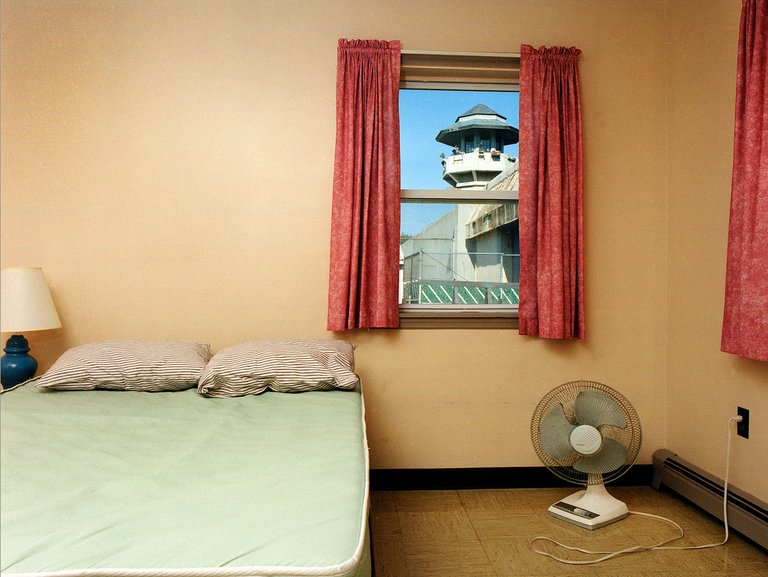

Sex, Love, & Marriage Behind Bars
What are conjugal visits really like? Incarcerated journalist John J. Lennon takes Esquire inside one of the last bastions of prisoner intimacy in America: trailers of New York.
I first heard about the trailers, prison vernacular for conjugal visits, on Rikers Island. It was 2002, I was twenty-four, and I was awaiting trial on murder charges. The guy the next bunk over in the communal dorm knew I was facing a lot of time, even if I didn’t know that. I was delusional in the beginning. We all are.
The bunkmate had just finished a dime—a ten-year sentence—for assault and was now in on a parole violation for breaking curfew, caught on a tip called in by his wife. Still, he loved her, and he loved telling me about going on conjugals with her up in Auburn, a maximum-security prison. It wasn’t just about the sex, he said. It was forty-eight hours of freedom, or close to it. Most of New York’s maximum-security prisons had them. They weren’t trailers, not anymore, but modular homes. He described the units: two, sometimes three bedrooms—the prison supplied pillows, bed linens, towels, and washcloths—a living room, a bathroom, and a full kitchen stocked with pots and pans, a coffee maker, a blender, and utensils. A wire bolted to the counter next to the sink was connected to the handle of the kitchen knife. His wife would bring clothes, cosmetics, and groceries: milk, eggs, pork chops, shelled shrimp. Glass containers weren’t allowed; neither was alcohol, not even as a makeup ingredient. Outside there was a picnic table, a barbecue pit, and a children’s play area.
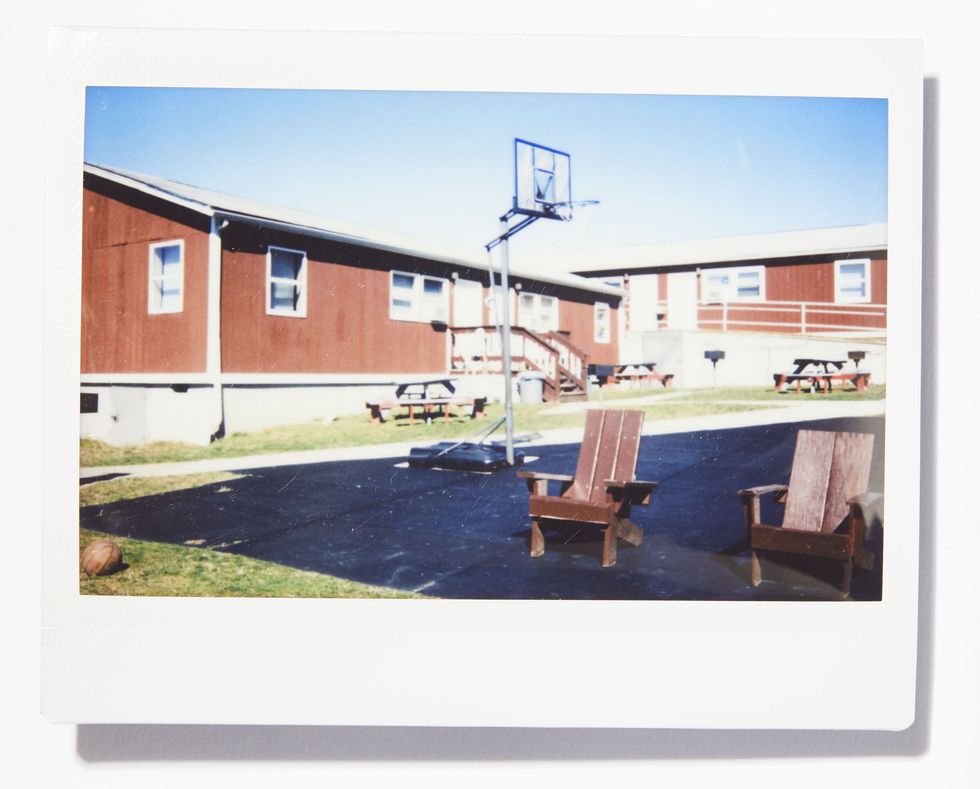
It was, the fella in the next bunk told me, an opportunity for good times, good eating, and good sex. An incentive to stay out of trouble in the hope of experiencing a touch of love.
There was a hitch: Your partner had to be your legal spouse. Close family members were also eligible, of course, and this was really the objective of these visits: to build and maintain better family ties. But that was beside my bunkmate’s point. If I was convicted, he said, he recommended I put an ad on one of those prisoner dating websites (Prison Pen Pals, Write a Prisoner), find a woman, fall in love, make it official, then head for the trailers.
In 2004, I was sentenced to twenty-eight years to life. The minimum was longer than I’d been alive. Early on, I didn’t think much about the implications for my love life. At twenty-four, I’d had plenty of sex but never a real relationship, or even healthy intimacy. Besides, there were more pressing concerns: appealing my conviction, learning how to survive in this place.
I first saw the trailers at Clinton Correctional, a maximum-security prison a few miles south of the Canadian border, in Dannemora. By then I’d learned that New York’s Department of Corrections and Community Supervision didn’t actually call them conjugal visits. Only Mississippi did. While the word conjugal simply means “related to marriage,” these visits began to carry lewd implications, and other states opted to rebrand: In California, it was known as “family visiting.” In Connecticut and Washington, they were referred to as “extended family visits.” In New York, it was, and still is, called the Family Reunion Program, or FRP.

In 2005, I had my first FRP visit—with my mother and my aunt. My aunt cooked bacon and eggs in the morning, grilled porterhouse steaks and tossed salads for dinner. We sank into the soft couches, ate, and watched Law & Order reruns, oddly Mom’s favorite show. We talked until interrupted by the muffled screams of a couple through the wall of the attached unit. We laughed awkwardly, avoiding eye contact, and I felt kind of jealous. Three times a day, a phone in the unit rang. I picked up, spat my last name and identification number into the receiver, then stepped outside and waved to the watchtower guard. That count was one of the only reminders of prison.
When I returned to my block, guys asked how the conjugal had gone. Great, I said. When I mentioned it was with my mother and my aunt, they sort of nodded, like, Oh, that’s cool, too. I loved visiting with my family. But I did start to think about what it would be like to be with a woman again.
.css-f6drgc:before{margin:-0.99rem auto 0 -1.33rem;left:50%;width:2.1875rem;border:0.3125rem solid #FF3A30;height:2.1875rem;content:'';display:block;position:absolute;border-radius:100%;} .css-1aglugu{font-family:Lausanne,Lausanne-fallback,Lausanne-roboto,Lausanne-local,Arial,sans-serif;font-size:1.625rem;line-height:1.2;margin:0rem;}@media(max-width: 48rem){.css-1aglugu{font-size:1.75rem;line-height:1.2;}}@media(min-width: 64rem){.css-1aglugu{font-size:2.375rem;line-height:1.2;}}.css-1aglugu b,.css-1aglugu strong{font-family:inherit;font-weight:bold;}.css-1aglugu em,.css-1aglugu i{font-style:italic;font-family:inherit;}.css-1aglugu:before{content:'"';display:block;padding:0.3125rem 0.875rem 0 0;font-size:3.5rem;line-height:0.8;font-style:italic;font-family:Lausanne,Lausanne-fallback,Lausanne-styleitalic-roboto,Lausanne-styleitalic-local,Arial,sans-serif;} Trailer visits were never perfect. Sometimes they were hard. But in many ways, they felt like rehearsals for life on the outside.
I got by with my hand and my memories, with the occasional assist from Buttman or High Society. Many of us who’ve been locked up all these years try idiosyncratic methods to pleasure ourselves. Some use a Fifi—a rolled towel with a plastic bag stuffed in the crevice; inside the bag is a rubber glove lubed with Vaseline that can be warmed in a hot pot of water, if one prefers. The crevice can be tightened or loosened by a strap wrapped around the rolled towel, creating different sensations. Fucking Fifis was an intimate ritual for one of my neighbors. At night he hung a curtain across his cell bars, prepped his Fifi, rolled the whole thing up in his mattress—he said it was more like a big-booty girl that way—laid out a few porno mags, and started thrusting.
But I wasn’t looking to hump a Fifi for the next twenty-five years.
Married men in the joint who went on conjugals seemed to have the most meaningful lives: They worked out, they went on visits, they sported crispy new sneakers and polo shirts with the horse, as if to say to the rest of us, I got a lady who loves me, and I got more status than you. At least, that’s how I took it. Every few months, they disappeared—most men kept their conjugal dates to themselves to avoid attracting envy—but we all knew where they’d gone. They came back to the cellblock with hickey-covered necks, looking pleasantly tired. I decided that was how I wanted to serve my sentence.
Mississippi State Penitentiary, of all places, was the first facility in the U. S. to offer conjugal visits, in the early 1900s. Also known as Parchman Farm, the segregated prison functioned as a revenue-generating plantation that produced cotton, cattle, pork, and more; its prisoners performed all the hard labor. To incentivize their work, administrators began arranging for prostitutes to visit on Sundays, and prisoners slept with them wherever they could—tool sheds, storage areas, the barracks. At first, only Black prisoners were allowed to participate, and for deeply racist notions “about Black men’s allegedly voracious sexual natures and appetites,” says Heather Ann Thompson, author of the Pulitzer-prize-winning history of the Attica uprising, Blood in the Water, “that Black prisoners could be forced to work even harder not just under threat of the lash but also, due to their savage nature, the promise of sex.”

Starting around 1940, all of Parchman’s prisoners were able to participate, regardless of race. By the late fifties, prostitutes were banned, replaced by prisoners’ spouses, common-law wives, and female friends. In 1972, the program opened to the facility’s female prisoners. Still, the system was marked by prejudice. “The most important question concerning a program of conjugal visiting,” wrote Columbus Hopper in his 1969 study of Parchman, Sex in Prison, “is whether it helps to reduce the problem of homosexuality in prison.” Hopper was the leading conjugals researcher of his time, and the “problem of homosexuality” seems to have been one of the main forces behind his advocacy. Truth is, in my twenty-one years of incarceration, I’ve never been sexually assaulted or witnessed that kind of assault.
New York’s first FRP began in 1976, with five 12-foot-by-70-foot trailers in a former cow pasture at Wallkill Correctional. Attica got its trailers in 1977, six years after the prisoner uprising for more humane treatment that, when law enforcement took back the prison, left thirty-nine dead. In the first eighteen months of Attica’s FRP, 1,179 prisoners participated.
By 1993, seventeen states allowed some version of extended family visits. That year in New York, 12,401 family members attended FRPs across the state. “The effectiveness of the program is beyond dispute,” the prison commissioner wrote in an op-ed around that time.
Data supports the former commissioner’s claims. According to a recent literature review, prisons that allow conjugal visits have better disciplinary records than those that do not. What’s more, studies have determined that released prisoners with an established relationship have a much better chance of not returning to prison. (In 1980, New York’s corrections department published findings suggesting that participation in the program decreased recidivism rates by as much as 67 percent.)
Yet since the start of such programs, fierce resistance has followed. By the early nineties, the era of mass incarceration was fully under way, and across the country, prison programs that incentivized good behavior—furloughs, work release, college, conjugals—were on the chopping block. Why, the thinking went, should we coddle criminals with taxpayer money? (It’s worth noting that FRP upkeep is paid for in part by prisoner fundraisers.) And don’t conjugals present one more way to introduce contraband?
As early as 1969, when Hopper published his findings on Parchman, conjugal visits were available in Chile, Ecuador, Japan, Mexico, Costa Rica, and the Philippines. Today, that list includes Qatar, Argentina, Brazil, Belgium, Sweden, Spain, France, Russia, and Saudi Arabia.
The United States has shifted in the opposite direction. In the eyes of the law, conjugal visits are a privilege, not a right. The Supreme Court has repeatedly upheld prison administrators’ latitude to limit prisoners’ rights, including visitation, writing in 2003 that “freedom of association is among the rights least compatible with incarceration.” In 2014, Mississippi did away with its program. “There are costs associated with the staff’s time,” the state’s prison commissioner said at the time. “Then, even though we provide contraception, we have no idea how many women are getting pregnant only for the child to be raised by one parent”—as if such family planning were his call to make.
Today, only four states allow conjugal visits—New York, California, Washington, and Connecticut—though when Covid came, Connecticut’s program was suspended, and it has yet to return. Federal prisons don’t offer the privilege. New York’s program has been a success: FRP is offered at twelve of its fifteen maximum-security prisons and eleven of its twenty-six medium-security prisons. Since 2011, same-sex couples have been able to participate. Yet each year over the past decade or so, Republican state senators have introduced a bill to eliminate FRP. Conservatives preach the importance of a solid family structure. Why would they want to sabotage prisoners who are trying to build and maintain theirs?
By 2009, I was in Attica; my appeals had been denied. I was thirty-two and lonely. I’d spend hours each day watching the tiny TV in my cell. The Bachelor was my favorite show—a glimpse of intimacy, however stage-managed, and a break from my bleak reality. I felt like I was squandering an opportunity by not putting myself out there. I told Mom what the guy on Rikers Island had suggested, and she put an ad on the prison dating website Friends Beyond the Wall.
Danielly was a year younger than me and lived with her teenage son in a housing project on the Lower East Side. “I’m Dominican, and brown. Do you like that?” she wrote. Yes, yes, I loved it! In an early letter, I brought up the trailers, told her to imagine an uninterrupted weekend together in a sort of cabin, no cell phones, no distractions—just us. She didn’t need to be sold. Her mom had married a guy who’d done time, she told me, and she remembered visiting those little homes in the prison as a young girl.

Danielly started visiting me at Attica. She was my type—curvy, full of attitude and affection. We had the kind of chemistry that made my stomach flutter. But I soon learned that my type was much harder to handle on the inside than it had been when I was on the outside. The guy she’d described as her ex-boyfriend was more like her current boyfriend. When I called her, she sometimes wouldn’t answer. I was left lovesick, and that’s no way to live in prison. So I let her go.
In January 2011, I started corresponding with Raina, a California blonde, thirty-nine, who’d never been married and had no kids, and it wasn’t a dealbreaker that I’d killed a man. She had a great sense of humor, and while she’d known darkness in her own life, she’d needle anyone who took theirs too seriously. I was hooked. She was emotionally intelligent, we spoke the language of recovery, and our relationship felt safe. She moved across the country for me. One day in 2012, in Attica’s visiting room, I proposed to her, and she said yes. Six months later, we joined a few other couples in a small room with a Goofy mural painted on the wall and Attica’s town clerk seated at a table, and we got married.
By 2014—after a series of applications, denials, appeals, and interviews, including one in which Raina was told I didn’t carry any sexually transmitted diseases—we had our first FRP date.
Two days beforehand, I had to piss in a cup under a guard’s gaze for my drug screen. Then again the day of, and again after I came off the trailer. Most of the work was on Raina: shopping, traveling, then getting processed, food pushed through an X-ray machine, gloved fingers sifting through her panties and K-Y jelly.
The corrections officer escorted a handful of us through the Attica lobby, a part of the prison I had never seen before. Gates opened and closed, and we walked to the FRP compound. A fence enclosed the five red-sided homes, situated so that the rest of the prison couldn’t see in. Though the watchtower guard kept a close eye.
Sitting on the couch, looking around, I felt . . . joy. In the system, you’re always waiting, and never for anything good: trial, sentencing, transfers, getting cuffed and shackled, always in a cell or a bullpen or on a bus eating bologna sandwiches. Now I didn’t know what to do with myself, and I loved it. I got up from the couch, turned on the stereo, then walked outside on the grass, sat on the children’s swing, went back inside. I grabbed the remote, turned on the flat-screen television, flipped through the stations. To do whatever I wanted, and to be waiting for my wife so we could do whatever we wanted—I felt giddy. Through the window I watched my neighbor in his kitchen as he boiled the silverware—forks, (butter) knives, a spatula, a ladle, all metal and engraved with tracking numbers—in one pot of water, and added a few drops of scented oil to another, to perfume the place. Finally, I heard one of the guys yell, “They’re here!”
A corrections van with blue-tinted windows pulled up, and the family members got out. A little boy ran to his father and jumped in his arms. And there was Raina. The CO let me help her with her luggage, which was in a container marked with our unit number.
As soon as the door of our unit closed, we threw the groceries—including cuts of filet mignon and A.1. sauce—on the table and started awkwardly kissing. As we began to undress, there was a knock on the door. Raina put on a shirt and I cracked the door. It was the CO, who just needed our container. It was like that, the conjugals; they were such a departure from regular prison life. Even the staff interactions were all good.
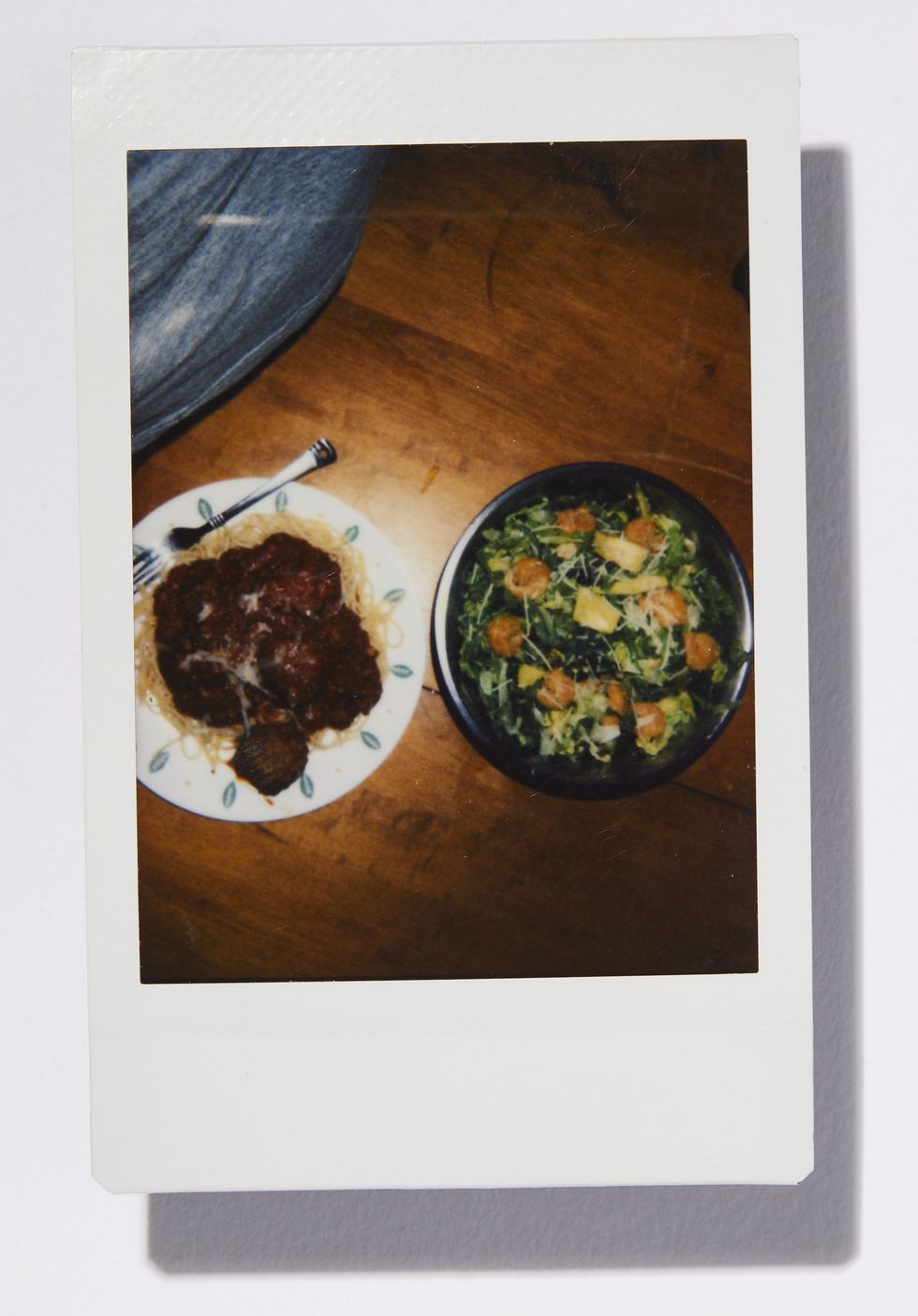
Raina and I got back to it. It was my first time in eleven years, so I figured I’d finish fast. But it was the opposite. We went at it for a while—soft, hard, slow, fast, this way, that way—and nothing seemed to bring either of us closer to climax. It was like I’d never touched a woman before. It felt weird that nobody else was watching us. I eventually pulled out and brought myself to ejaculation.
On some level, we hadn’t expected the first time to be amazing. Though it’s hard to make bad sex better, we had to try. We loved each other. We went on six more FRP visits, but the situation didn’t improve. Our issues were less about friction and more about fantasy, or the lack thereof.
Danielly had sent me letters over the years since we’d first met, none of which I’d replied to. But in 2015, as my relationship with Raina was coming to an end, I finally wrote back, explaining my marital woes. Danielly replied that I never should have gotten married in the first place, that she was my soulmate. She said she was still on and off with her boyfriend, but he didn’t matter. If I got divorced and married her instead, she’d come to Attica and fulfill all my fantasies.
I divorced Raina and proposed to Danielly.
In October, we got married by the same Attica town clerk who’d officiated the last time. The Goofy mural was gone. We posed for our wedding picture in front of a seascape of sea lions and colorful fish. Danielly looks sad in the photo, barely smiling. She’d wanted this day to be so much more special than it was.
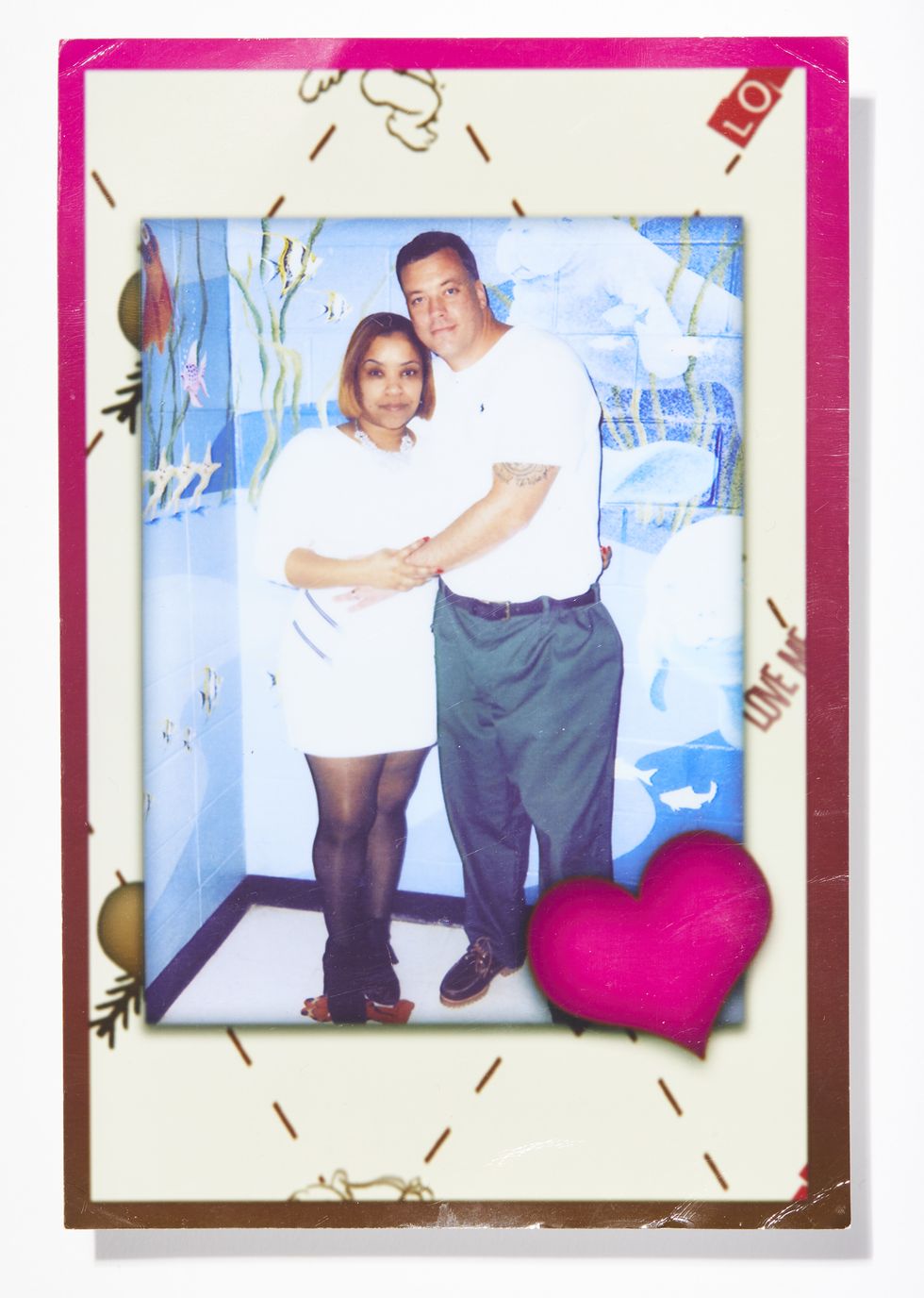
Afterward, I bribed a CO with a few packs of Newports to let the cellblock’s tattoo artist come into my cell, and with a needle made from an uncoiled lighter spring powered by a repurposed beard-trimmer motor, he inked danielly on the inside of my upper arm in looping script. Once she ditched the boyfriend for good, she had my name inked on her forearm. We craved each other. Our kisses, deep and long and wet, always felt like good sex.
I wanted to transfer to Sing Sing, forty miles north of New York City—among other reasons, it would take Danielly an hour by train, as opposed to the eleven-hour bus trip she took both ways to visit me at Attica. But Attica was a disciplinary prison, rife with violence; the number of prisoners on good behavior was low, the FRP waitlist short. You could book a spot every forty or fifty days. At Sing Sing, the wait was closer to ninety days. I weighed the pros and cons. Con: waiting twice as long to be together. Pro: saving Danielly the hassle of a big trip to the middle of nowhere, which would probably mean I’d see her more often.
I submitted my paperwork, got approved, and transferred in November 2016.
In February, we had our first FRP date. The compound was pretty much the same as the one at Attica, but at Sing Sing we got a Polaroid camera and twelve blank photos. Some couples went into the units and did not come out for the allotted forty-eight hours. Others were more social. Me and my friend Andy Gargiulo—convicted in 2006 of killing his reputed mobster brother-in-law; we’d had the same lawyer—would sometimes coordinate our FRP visits. He was a lot older than me, around eighty, but we got along. So did our better halves. His wife brought the best Italian food in Brooklyn—cannolis, fresh mozzarella, and tender veal—and when the weather was nice, the four of us would sit outside and barbecue.
Danielly was provocative, and that turned me on. We argued; we canceled visits on each other. We often had angry, shit-talking sex. Sometimes we played nice, but she’d never let it get to my head. “Boy,” she’d say, “you have so much to learn about women.” We couldn’t have sex for the entire forty-eight hours, but it sometimes felt like we were trying.
Intimacy came in other forms. She introduced me to ASMR; I brewed Bustelo for her and microwaved the half-and-half so it wouldn’t cool off the coffee too much. “Coffee,” by Miguel, became our song. We watched The Notebook, and she recited her favorite lines. We watched Warrior, and when Tom Hardy’s character hugs his drunk father, played by Nick Nolte, Danielly comforted me as I cried.
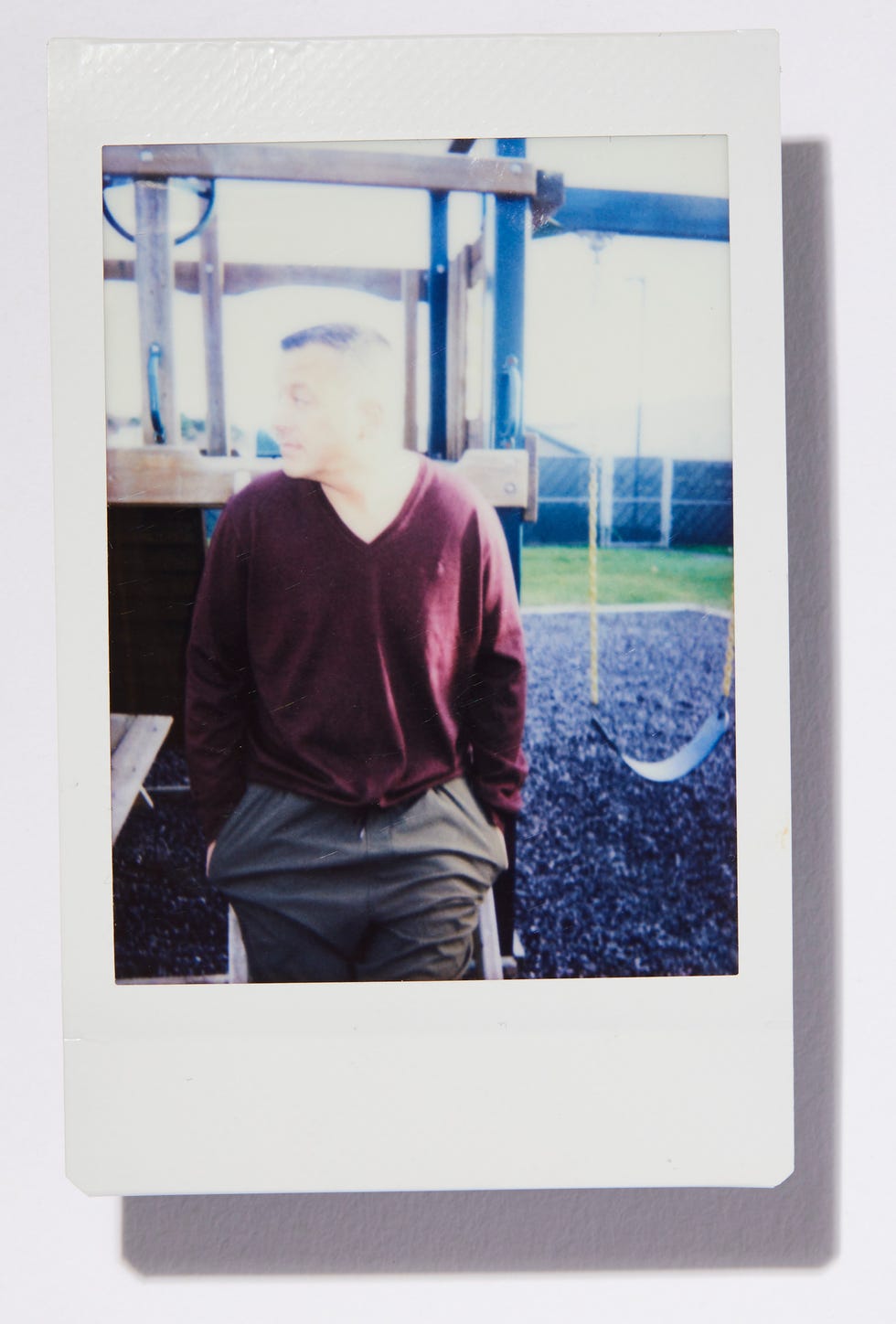
I know now that our relationship wasn’t healthy. My moments of joy were outweighed by my jealousy and anxiety. I’d get annoyed if she didn’t read my latest article. “You’re all into yourself and your career,” she’d say. “Women don’t like that, bro!” Or “I fell in love with the guy at Attica, before he became the writer.” That one hurt. But it’s not like I’d ask about her job as a nurse at a Bronx clinic. She’d want to talk about our future, and I’d urge her to stay in the present. She’d storm off into the bedroom, slam the door, and curse me out in rapid-fire Spanish. Well, I’d think, this is life.
By March 2020, our relationship was rocky. But for the first twenty-four hours of our first FRP in more than a year, we were getting along. As we prepped lunch, a knock came at the door. It was the security captain. Because of Covid, our visit was over, along with our last shot at rekindling.
By the time FRP visits were restored, a year and a half later, I’d been transferred to Sullivan Correctional, in the southern Catskills. Danielly came up twice. But too much time had passed, and other relationships had formed: hers with somebody else, mine with my career. Becoming a journalist in the joint brought its own stress, and my anxiety worsened; things like pissing in a cup with a guard peeking seemed impossible. Recently, we divorced.
Would I have been better off not having experienced intimacy for the past twenty-one years? Would Raina and Danielly have been better off never having met me? I’ve since realized that in both relationships, I focused more on the affection I was getting than the affection I was giving. All this time spent living in my head, confined to a six-foot-by-nine-foot cell, has rendered me less expressive and more emotionally stuck. My thoughts would bounce around my brain but never make it out of my mouth, which left Raina, then Danielly, feeling neglected. The time I used to spend writing love letters I now spend writing articles. Sometimes I feel like I took the two of them for granted. There’s an immense effort, this leap toward love in which the only physical manifestation comes in the form of conjugal visits. And it’s exerted not by the prisoners but by our partners. They wait, they shop, they lug, they travel, they get gossiped about by friends and family and insulted by COs.
Trailer visits were never perfect. Sometimes they were hard, especially at the end—me returning to prison, my woman going home alone. But in many ways, they felt like rehearsals for life on the outside. I believe that because of my experiences with conjugals, when I do get out, I’ll be more sensitive to the feelings of those closest to me. “It remains utterly and inescapably true that to be a human being is to need to be connected to, to bond with, and to be nurtured by other human beings,” Heather Ann Thompson told me. “Serving one’s sentence does not change that.”
So I’m single now. Middle-aged, too. Sometimes I imagine the kind of woman I’ll attract when I’m on the outside, and I wonder if I’ll resent her because she didn’t fall for me when I was on the inside. Which is absurd, and I know I need to work that shit out. But it also feels like a nod to the women who’ve loved me, a thank-you to all the partners who’ve sacrificed so much to share their love with those of us who are locked up.
I think about a moment Danielly and I shared with Andy and his wife, who was wearing Prada glasses and a perfume called La Vie Est Belle. The sun was bright; we sat at the picnic table, eating the best of both kitchens. Andy was talking about a TV show he watched in his cell—maybe it was America’s Got Talent —and Danielly told him how she also loved that show. While recalling the final performance of a child singer who’d recently won, Andy choked up. Right there at the wooden table, surrounded by the thirty-foot concrete wall and the guard with the AR-15 perched in the tower. Danielly teared up, too. “He gets emotional on these visits,” Andy’s wife said in a tough Brooklyn accent, smiling. More than the sex, it’s moments like these—simple, safe, and endearing—that have provided me with what prison has stripped away: a taste of intimacy.

@media(max-width: 73.75rem){.css-1ktbcds:before{margin-right:0.4375rem;color:#FF3A30;content:'_';display:inline-block;}}@media(min-width: 64rem){.css-1ktbcds:before{margin-right:0.5625rem;color:#FF3A30;content:'_';display:inline-block;}} Esquire Select Exclusives

What Happens When Your Longtime Therapist Dies?
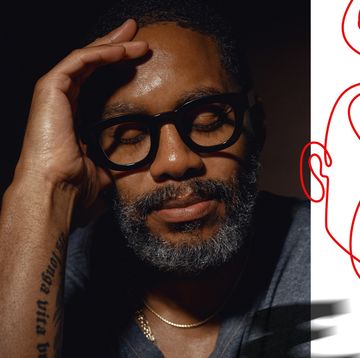
How (Not) To Grieve

What Is Successful Nonmonogamy Anyway?

American Tragedy: The Death of an Alabama Pastor

Is “Doomslang” Making Us All Numb?

Is It Even Possible to Become More Productive?

The All-American Father

What If Profound Lovesickness Isn’t Romantic?
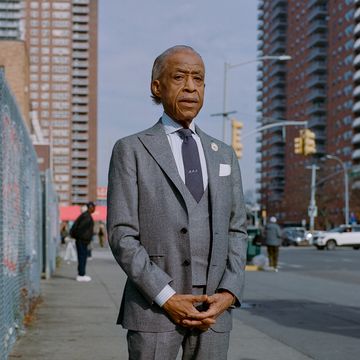
The Redemption of Al Sharpton
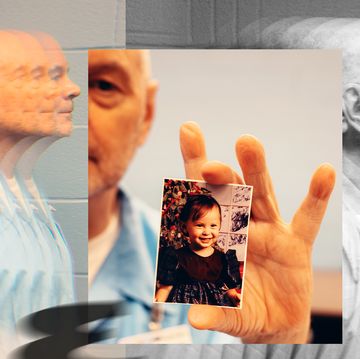
What Really Happened to Baby Christina?

Inside My Mid-Life Crisis

Reckoning with the South

This couple wants you to know that conjugal visits are only legal in 4 states
- Click to share on Twitter (Opens in new window)
- Click to share on Facebook (Opens in new window)
- Click to share on Pocket (Opens in new window)
- Click to email a link to a friend (Opens in new window)

Editor's note: This story was co-written by inside-outside couple Steve Higginbotham and Jordana Rosenfeld, weaving together Jordana's personal experience and reporting with letters from Steve. Together, they examine popular myths around conjugal visits, their decreasing availability, and the punitive logic behind the state's policing of sex and intimacy that stifles relationships like theirs. Jordana's words appear below in the orange boxes on the right; Steve's are in the purple on the left.

The other day, when I told my grandmother I was researching the history of conjugal visits for an essay, she said, "Oh, like in my stories?"
You can't talk about conjugal visits without talking about television, because television is pretty much the only place where conjugal visits still exist. A wide variety of TV shows either joke about or dramatize conjugal visits, from popular sitcoms that have little to nothing to do with prison life, like The Simpsons , Family Guy , and Seinfeld, to prestige dramas like Prison Break and Oz that purport to offer "gritty" and "realistic" prison tales. Conjugals loom large in public imagination about life in prison, which leaves people under the unfortunate impression that they are in any kind of way widespread or accessible.
Their availability has been in steady decline for more than 25 years. The mid-to-late 1990s are the often-cited high point of conjugal visits , with 17 states offering some kind of program. (Federal and maximum security prisons do not allow conjugals.) This means that at their most widespread, conjugal visits were only ever permitted in one-third of all states.
There are only four U.S. states that currently allow conjugal visits, often called "extended" or "family" visits: California, Connecticut, New York, and Washington. Some people say Connecticut's program doesn't count though, when it comes to conjugals—and the Connecticut Department of Corrections agrees. Their family visit program is explicitly intended for the benefit of children and requires that the incarcerated person receiving visitors be a parent. Their child must attend .
My boyfriend has been in prison for 28 years. He was 18 during the high point of conjugal visit programs. That's when the state of Missouri decided to lock him up for the rest of his natural life, effectively sentencing him to a lifetime of deep loneliness and sexual repression, not just because Missouri doesn't offer conjugal visits, but because when you are incarcerated, your body belongs to the state in every possible way—from your labor to your sex life.
Every prison riot ever could have been prevented with some properly organized fucking.

That's my boyfriend, Steve.
Not being able to physically express love—or even lust—builds frustration that boils over in unintended ways.
Intimacy is policed rigidly in prison, and it has certainly worsened over the years. For most people with incarcerated lovers, intimacy happens not on a conjugal visit, but in the visiting room. Visits now may start and end with a brief embrace and chaste kiss. Open mouth kissing has been outlawed. These rules are enforced with terminated visits and even removing a person from the visiting list for a year or more.
Steve and I have kissed a total of six times.
We have also hugged six times, if you don't count us posing with his arm over my shoulder three times for pictures. The kisses were so brief that I'm not sure I remember what they felt like. He told me later on the phone that he knew he had to be the one to pull away from the kiss before we gave the COs in the bubble reason to intervene because I wouldn't. He knew this, somehow, before he ever kissed me. He was right.
When I last visited him in Jefferson City Correctional Center, Steve told me about a real conjugal visit from '90s Missouri.
Years ago, people used to mess around in the visiting room at Potosi [Correctional Center]. Everyone knew to keep their sensitive visitors away from a certain area, because there was frequent sex behind a vending machine. I can neither confirm nor deny that cops were paid to turn a blind eye to it. I met a guy recently in my wing at JCCC who said he had heard of me, and that maybe I knew his father. I did know his father. I didn't have the heart to tell him that I probably saw his conception behind a Coke machine back in 1995.
The increasing restriction of physical touch—the expanded video surveillance of visiting spaces, the use of solitary confinement for the smallest infractions, and the withering of both in-person and conjugal visit programs—reflects the punitive logic that consensual human touch is a privilege that incarcerated people do not deserve.
This is an evil proposition, and it's one that is at the core of the ongoing dehumanization of millions of people in U.S. prisons, and the millions of people like me who love them.
One woman with an incarcerated partner put it to researchers this way: "The prison system appears to be set up to break families up." And she's right. For the duration of his incarceration, I will never be closer to Steve than the state of Missouri is. I'm reminded during each of our timed kisses: His primary partner is the state.
The most difficult part for me about a romantic relationship with a free woman is that I feel selfish. A lot of self-loathing thoughts creep in. I want the best for her and often question if I am that "best." However, an added benefit is that we can truly take things slowly and explore each other in ways that two free people don't often experience nowadays. We write emails daily. And these are important. We vent. And listen. We continue to build, whereas many free people stop building at consummation.
But these are the realities rarely captured in media portrayals of romantic relationships between free world and incarcerated partners. Conjugals on TV are so disconnected from what it's actually like to be in a romantic relationship with an incarcerated person: Trying to schedule my life around precious 15 minute phone calls, paying 25 cents to send emails monitored by correctional officers, finding ways to symbolically include Steve in my life, like leaving open the seat next to me at the movies. Instead, television shows depict implausible scenarios of nefarious rendezvous that often parrot law enforcement lies. When they do so, they undermine the public's ability to conceptualize that love and commitment fuel relationships like ours.
Although contraband typically enters prisons through staff , not visitors , television shows often present conjugal visits as a cover for smuggling, like in the earliest TV plot I could find involving a conjugal visit, from a 1986 Miami Vice episode. After his girlfriend is killed, Tubbs gets depressed enough to agree to go undercover at a state prison to bust some guards selling cocaine. In his briefing on the issue, Tubbs asks how the drugs are getting into the prison. Conjugal visits and family visits are the first two methods named by the prison commissioner, never mind that I have yet to find any evidence that Florida ever allowed those kinds of visits.
Often, the excuse for policing visits so strictly is that drugs can be exchanged. But I know that lie is used for every type of control in prison. For over a year we had NO CONTACT visits because of the pandemic. During that time, dozens of inmates [at my facility] still overdosed and had drug-related episodes that caused them to need medical attention. Those drugs certainly didn't arrive through visits. They strip search and X-ray me going to and from visits anyway.
Everything in prison now is on camera. When a drug overdose occurs, the investigators track back over footage from visiting room cameras. One officer told me that while they were investigating drugs allegedly passing through the visiting room, they saw a guy covertly fingering his wife. This has happened on more than one occasion, but most guards will have enough of a heart not to bother with violations for some covert touching that wasn't caught until the camera review. Most. Sometimes, a rare asshole will just have to assert his power and write a CDV (conduct violation).
Write-ups or CDVs are given by staff at their discretion. The threat of solitary confinement is always looming in prison. It's another clever way of withholding physical interactions with other human beings as a form of torture. Solitary confinement for anywhere from 10 days to three months is a favorite punishment for "[nonviolent] sexual misconduct. "
There's also a persistent media narrative that prison systems offer conjugal visit programs out of genuine concern for human welfare. A brief glance at the origins of conjugal visits in the U.S. prison system quickly disproves that theory, showing that conjugal visit programs were conceived as a tool of exploitation and social control.
Conjugal visits originated in Mississippi at the infamous prison plantation, Mississippi State Penitentiary, or Parchman Farm. Mississippi state officials opened Parchman in the early 1900s, writes historian David Oshinsky in his book Worse than Slavery: Parchman Farm and the Ordeal of Jim Crow Justice, in order to ensnare free Black people into forced labor. Mississippi, like other Southern states during Reconstruction, passed "Black Codes" that assigned harsh criminal penalties to minor "offenses" such as vagrancy, loitering, living with white people, and not carrying proof of employment—behaviors that were not considered criminal when done by white people. Using the crime loophole in the relatively new 13th Amendment, Mississippi charged thousands of Black people with crimes and forced them to work on the state's plantation.
Parchman officials started offering sex to Black prisoners as a productivity incentive, "because prison officials wanted as much work as possible from their Negro convicts, whom they believed to have greater sexual needs than whites," Oshinsky writes.
"I never saw it, but I heard tell of truckloads of whores bein' sent up from Cleveland at dusk," said a Parchman prison official quoted by Oshinsky. "The cons who had a good day got to get 'em right there between the rows. In my day, we got civilized—put 'em up in little houses and told everybody that them whores was wives. That kept the Baptists off our backs."
A certain kind of sexual morality has been instilled in the minds of many people with conservative religious upbringings. They naturally force this morality on people they consider children. That is how many guards see prisoners: as children.
Many states did not begin to join Mississippi in offering conjugal visits until much later in the century, when conservative governors like California's Ronald Reagan would determine in 1968 that allowing some married men to have sex with their wives was the best way to reduce " instances of homosexuality " in prisons.
Abolitionists who wrote the book Queer (In)Justice , consider how concerned prison administrations have historically been and continue to be about queer sex in prisons. The book exposes both the deep fear of the liberatory potential of queer sexuality, and a broader reality that prisons are inherently queer places since prisons' "denial of sexual intimacy and agency is a quintessential queer experience."
Beyond behavioral control, the rules that determine conjugal visit eligibility are always also about enforcing criminality, since the state decides what kind of charges render someone ineligible to wed or to have an extended visit. Even in the four states that allow these visits, most people with "violent" charges are only allowed to hold their lover's hand and briefly embrace at the beginning and end of visits.
We don't even have enough privacy to masturbate.
I can be written up if anyone sees my dick, especially in the act of masturbation. I could face solitary confinement, loss of job, visits, religious programs, treatment classes, recreation, canteen spend, and school for getting written up. Conversely, I can be strip-searched at any given time and be forced to show everything.
Living in this fishbowl has taught me there is no hiding. Too many bored eyes in the same small area to miss anything. Guards may come knocking on the door at any moment. My cellmate is often inches away from me, and it takes coordination to manage time away from each other because we eat, sleep, go to yard, and do just about everything on the same schedule.
I choose to skip a meal occasionally and embrace the hunger, because it is much less painful than persistent relentless desire. After years of self-release in showers, in a room with snoring cellmates, or as quickly as possible when a brief moment of privacy occurs, my sex drive is all shook up. Current turn-ons could be said to include faucets running and/or snoring men.
Ultimately, this article is not about the right to conjugal visits. It's about the ways that punitive isolation and deprivation of loving physical contact have always been tactics of the U.S. prison system.
Regardless of the quality of the representations, the prevalence of conjugal visits in movies and TV allows people to avoid thinking too hard about what it's like to be deprived of your sexual autonomy, maybe the rest of your life.
I have been locked up since I was 18, and I am 47 now. To be horny in prison for decades is painful. To the body and soul.
There is justice as well as pleasure at stake here, and the difference between the two is slight.
People who love someone in prison live shorter and harder lives. That we do it anyway shows the significance, centrality, and life-affirming nature of intimate relationships to those on both sides of the wall. Maybe it even points to the abolitionist power of romantic and sexual love between incarcerated and "free" people.
So, I guess we start with that thought and work from there to find a way to tear down the system.

As part of Scalawag's 3rd annual Abolition Week, pop justice is exclusively featuring perspectives from currently and formerly incarcerated folks and systems-impacted folks.
More in pop justice:.

Hell and High Water: From Gaza to Mississippi

'It's not a story—it's a life:' A look at Snapped, from the inside

Come on Barbie, give us nothing!

Barbie: Pretty Police
Related stories:, steve higginbotham & jordana rosenfeld.
Steve Higginbotham is a writer who spent many years narrating and transcribing materials into braille for the Missouri Center for Braille & Narration Production . He is serving a death by incarceration sentence in Jefferson City, Missouri. Jordana Rosenfeld is a journalist in Pittsburgh, Pennsylvania. More of her work can be found at jordanarosenfeld.com .
- Share full article
Advertisement
Supported by
As Conjugal Visits Fade, a Lifeline to Inmates’ Spouses Is Lost

By Kim Severson
- Jan. 12, 2014
PARCHMAN, Miss. — To spend time alone with the man she married four months ago, Ebony Fisher, 25, drives nearly three hours through the flat cotton fields of the Mississippi Delta until she pulls into a gravel lot next to the state’s rural penitentiary.
She joins her husband, who in 2008 began serving a 60-year sentence for rape, aggravated assault and arson, in a small room with a metal bunk and a bathroom. For an hour, they get to act like a married couple.
“That little 60 minutes isn’t a lot of time, but I appreciate it because we can just talk and hold each other and be with each other,” said Ms. Fisher, who is studying to be a surgical assistant.
But conjugal visits, a concept that started here at the Mississippi State Penitentiary as a prisoner-control practice in the days of Jim Crow, will soon be over. Christopher B. Epps, the prison commissioner, plans to end the program Feb. 1, citing budgetary reasons and “the number of babies being born possibly as a result.” In Mississippi, where more than 22,000 prisoners are incarcerated — the second-highest rate in the nation — 155 inmates participated last year.
Since they began here in the early 1900s, when the penitentiary was just called Parchman Farm, conjugal visits have been an unlikely barometer of racial mores and changing times both in Mississippi and in states like California and New York, where married same-sex couples can participate.
In the 1970s, new prisons often included special housing for what had come to be called extended family visits. But by 1993, only 17 states allowed conjugal visits. Mississippi is one of just five that have active programs.
In California and New York, they are called family visits and are designed to help keep families together in an environment that approximates home. Some research shows that they can help prisoners better integrate back into the mainstream after their release.
Visits in those states, and in Washington and New Mexico, can last 24 hours to three days. They are spent in small apartments or trailers, often with children and grandparents, largely left alone by prison guards. Visitors bring their own food and sometimes have a barbecue.
In New York, about 8,000 family visits were arranged last year, a figure that corrections officials say has declined. Of those, 48 percent were with spouses. The rest were with family members such as children or parents.
Studies cited by Yale law students in a 2012 review of family visitation programs showed that the programs could work as powerful incentives for good behavior, help reduce sexual activity among prisoners and help strengthen families.
Though what qualifies prisoners for the visits varies from state to state, all must have records of good behavior and be legally married. In most, prisoners in maximum security or on death row are denied the visits. Federal prisons do not allow them.
Mississippi ended its more extensive family visitations last year but left in place the hourlong visits, which since their inception a century ago have been designed more as a way to control inmates than nurture relationships.
“Conjugal visits have been a privilege,” said Tara Booth, a spokeswoman for the Mississippi Corrections Department. “So in that sense, it has, as other internal opportunities, helped to maintain order.”
The notion of allowing prisoners to have sex was born here shortly after Parchman Farm opened in 1903 as a series of work camps on 1,600 acres of rich Delta farmland. Inmates, most of whom were black, were used as free farm labor in an arrangement not that far removed from slavery.
Set in the middle of the birthplace of the blues, Parchman Farm has been the subject of many songs written by classic bluesmen like Bukka White and others who did time here.
The warden at the time believed sex could be used to compel black men to work harder in the fields, according to a history on the practice produced in the 1970s by Tyler Fletcher, who founded the department of criminal justice at the University of Southern Mississippi in 1973. So black prisoners were allowed time on Sunday with spouses or, more often, prostitutes.
By the 1940s, makeshift lean-tos and shacks built by inmates for the visits gave way to formal facilities, and white inmates were more likely participants than black ones.
Announced in December, the decision to stop the hourlong conjugal visits came as a surprise to the handful of prison spouses who rely on them. Several have taken to Facebook and other online forums and written to lawmakers to try to save what they say is an essential part of their relationships. A Mississippi prisoners’ advocacy group and a Memphis-based civil rights organization have planned a rally for Friday in Jackson, the state capital, to protest the policy change.
But State Representative Richard Bennett, Republican of Long Beach, wants the practice stopped, and he said no amount of protest would change his mind.
He said he learned about conjugal visits a few years ago when an elementary school principal told him a student of hers had shown up with a photograph of a new sibling. The student’s mother was incarcerated. The baby had been conceived during a conjugal visit.
In 2012, Mr. Bennett introduced a bill to end the visits. It did not get much attention, so he will try again when the Legislature meets this month. He said he was aware of Mr. Epps’s plans, but wanted a permanent ban. Officials have not offered any figures on the number of babies born or the program’s cost.
“I don’t think it’s fair to the children conceived and to the taxpayers,” he said. “You are in prison for a reason. You are in there to pay your debt, and conjugal visits should not be part of the deal.”
But Tina Perry, 49, a production manager at a small newspaper in eastern Mississippi, said the spouses of prisoners should not be forced to suffer any more than they already do. And the state, she said, should not take away something that is inexpensive and infrequent but essential.
She has been visiting her husband in prison every couple of months for eight years. He is serving time for molesting his former wife’s daughter, and has 19 more years to go. Ms. Perry said he was innocent. She called the surroundings, a small room with a thin mattress, “nasty” but said it was an hour she treasured nonetheless.
“It’s your husband,” she said. “You take what you can get.”
Ms. Fisher, whose husband is facing 60 years, said she was heartbroken because no more conjugal visits meant no children.
“Let me have that option,” she said. “I feel like they are taking away my choice.”
But officials who want the practice to be stopped say the state should not be helping to produce children who will be raised by single parents and possibly need state support.
There are concerns, too, about cost and H.I.V. transmission.
Women interviewed about the visits said they would be willing to pay to defray costs. And they made it clear that the visits were not about the sex. They are about privacy in a world where every letter is opened, every call monitored. Regular visits are crowded with other prisoners and their families.
“You never just get husband and wife time,” said Amy Parsons, an office worker in Arkansas who drives eight hours to see her husband, who was convicted of aggravated assault. His release date is 2022.
“It’s not romantic, but it doesn’t matter,” she said. “I just want people to realize it’s about the alone time with your husband. I understand they are in there for a reason. Obviously they did something wrong. But they are human, too. So are we.”
Vista DUI Lawyer and Criminal Attorney Peter M. Liss
- Vista DUI Attorney
- DMV Hearings
- DUI Defenses
- Domestic Violence
- Sex Crime Defense
- Child Molestation
- Child Pornography
- Hit and Run Accident
- No-License Driving
- Reckless Driving
- Juvenile Crime
- The Three Strikes Law
- Weapons Charges
- Theft Defense
- Fraud Charges
- Drug Offenses
- San Diego Office
- The Criminal Process
- Criminal Defense FAQ
- Hiring a Criminal Lawyer
- Vista Criminal Law Blog
- Contact Us 24/7
Conjugal Visits Are Real and They’re Great for Society
May 28, 2021 Written by Jill Harness and Edited by Peter Liss

Conjugal visits are regularly referenced in movies and TV shows but they almost seem unreal. After all, why should people serving time for crimes be allowed to have sex when they’re supposed to be punished? But that’s one of the big misconceptions about what the California Department of Corrections and Rehabilitation calls “Family Visits.” The official name isn’t just bureaucratic code for conjugal visits -the real reason the state allows these visits is to provide inmates to stay close to their families. And studies show this kind of visitation program has some profound benefits.
How did Conjugal Visits Get Started?
Conjugal visits were originally introduced in Mississippi state in the early 1900s. At the time, inmates were essentially just used as slaves, even physically beaten if they broke the rules or failed to work hard enough. To provide positive encouragement for those who worked hard and followed the rules, the prison brought prostitutes for the best inmates every Sunday. Eventually, the prison started allowing prisoners’ wives and girlfriends to visit as well.
The idea eventually caught on, and over the years, many other states adopted the idea of letting wives spend time with their inmate husbands, with over 1/3 of states in the United States eventually enacting some type of conjugal visit program. Unfortunately, with the push to “get tough on crime” that took place in the 90s, many states got rid of these types of programs, which were seen as “being soft on crime” by giving prisoners “sex visits” when they should be being punished. Nowadays, the only four states that offer conjugal visits are California, Connecticut, New York and Washington.
What is a Conjugal Visit?
A conjugal visit is where an inmate gets to see their family with some slight level of privacy and intimacy. One of the big misconceptions about these visits is that they are purely designed to allow prisoners to have sex. While that may be how the program started and may be part of the experience for married couples, the true purpose of the visits is to allow prisoners the opportunity to spend time with their families. Notably, in New York, where inmates are allowed to visit with extended family members, only 48% of these meetings were with a spouse.
Even when the visit is with a spouse, most inmates say that while the chance to have sex with their partners was nice, the family visit was more about being intimate with the person they love for anywhere from 30 to 40 hours. Considering that standard prison visits require all conversations be monitored by guards, and partners are only permitted to kiss at the start and end of the visit, the chance to have private discussions for 24 hours and spend the night in bed together is a welcome change.
How do the Visits Work?
Inmates who qualify for family visits can spend up to 40 hours in an apartment located on prison grounds with their spouses, domestic partners, or other immediate family members, including children, siblings or parents. These apartments are equipped with toiletries, sheets and condoms.
Prisoners are allowed no more than four visits per year. Unfortunately, because of the program’s popularity and the limited number of prison apartment spaces, it’s more likely prisoners will only be able to participate twice a year.
Not all prisoners are eligible for the program. Anyone on death row, who is serving a life sentence, or who was convicted of a sex offense is ineligible. Additionally, inmates must have a record of good behavior, and anyone on disciplinary restrictions cannot participate. Those eligible must apply through their correctional counselor.
Visiting family members will not be strip-searched, though the prisoner will. While the visit is mostly unsupervised, the area will be searched as often as every four hours.
Visitors must follow many rules , including what they wear. For example, no one can wear blue jeans, and women cannot wear short dresses, short skirts, strapless tops or form-fitting clothing.
Why do States Allow for Family Visits?
There are many benefits, but the biggest one is a dramatic reduction in recidivism rates . One study in New Mexico (which recently discontinued conjugal visits) showed that prisoners who participated in extended family visits had 70% less chance of ending up in prison than those who did not participate.
Family visits are, therefore, more effective than education in keeping former felons out of prison. The effectiveness of these programs makes sense, considering they help maintain relationships between inmates and their loved ones. These relationships are critical in helping convicts readjust to life outside prison after release.
Though many people consider these programs to be a waste of taxpayer money, it’s been shown that every $1 spent on education in prisons saves taxpayers $5 annually due to the reduced cost of housing prisoners. Given that visits with family members cost less and are even more effective at reducing crime rates, maintaining these programs seems to be a no-brainer.
Reducing recidivism rates is not the only benefit of conjugal visits. By encouraging prisoners to be good to earn time with their loved ones, prisons can reduce violence and dangers to other inmates and guards -which could further reduce the tax rates associated with incarceration. More savings can be realized as well, because the more prisoners are model citizens, the more likely they are to be eligible for early release programs, where they can enjoy a complete family reunion outside of the prison.
There is also evidence that conjugal visits reduce prison rape . One study found that sexual violence in prison occurred at a rate of 226 per 100,000 prisoners in states without these programs while occurring at a rate of 57 per 100.000 prisoners in states with family visits.
Conjugal Visits During Covid-19
Unsurprisingly, these programs were temporarily discontinued as a result of the ongoing pandemic, but they have since been reinstated. To participate in visits , all guests over 2 must be vaccinated or show proof of a negative covid test taken within 72 and 96 hours of the visit. Following the visit, inmates must take a covid test within 72 and 96 hours. Those who test positive, are unvaccinated, or refuse to take the test will be placed in quarantine after the visit.
Alternative Sentences are Still Preferable
Of course, being allowed to continue living with your family is better than any conjugal visit. Maintaining your family life is possible if you prove your innocence or are given an alternative sentence such as probation. Your choice of criminal lawyer makes such a drastic difference in the outcome of your case. If you have been accused of any crime, please call (760) 643-4050 to schedule a free initial consultation with Peter M. Liss.
- DUI / Felony DUI
- Driving Offenses
- White Collar Crimes
- Violent Crimes
- Sex Offenses
- Privacy Policy
- Terms of Use
Attorney Peter M. Liss, (760) 643-4050 380 S Melrose Drive #301 Vista, CA 92081

Copyright 2003, 2021 Peter M. Liss, Esq. ALL RIGHTS RESERVED
About the Legal Information on This Website
I rely on my experience as a top defense lawyer in my area to personally review all information on this site; however the information offered here should not substitute as legal advice. If you have been arrested or charged with a crime in Vista, please contact a qualified defense attorney.
- Celebrities
Prison Wives Where Are They Now?

Introduction to Prison Wives: A Unique Subculture
The term “Prison Wives” refers to the women who stand by their incarcerated spouses through thick and thin. These women often face a unique set of challenges, including stigma, financial hardship, and emotional turmoil. The reality TV show “Prison Wives” brought some of these stories to light, showcasing the lives of several women as they navigated the complexities of being married to men behind bars. But what has happened to these women since the show aired? In this article, we delve into the lives of the “Prison Wives” to discover where they are now.
Understanding the Impact of Incarceration on Relationships
Before we explore the current status of the “Prison Wives,” it’s important to understand the profound impact that incarceration can have on relationships. The separation, the stigma of being associated with a criminal, and the financial and emotional strain can take a significant toll on a marriage.
The Reality Show: A Brief Overview
“Prison Wives” was a reality TV series that aired on Investigation Discovery, providing a glimpse into the lives of women married to inmates. The show highlighted their daily struggles and the strength it takes to maintain a relationship with someone who is serving time.
Where Are They Now: Updates on the Prison Wives
Since the show ended, many viewers have been curious about the current lives of these resilient women. While some have thrived, others have faced ongoing challenges. Here’s a look at where some of the “Prison Wives” are today.
Cheryl and Tyrone
Cheryl, who was married to Tyrone, a man serving a life sentence, has continued to advocate for prison reform and the rights of inmates. She remains active in various support groups for prison wives.
LaQuisha and Nathaniel
LaQuisha, whose husband Nathaniel was serving a lengthy sentence, has since focused on her personal growth. She has returned to school and is working towards building a career to support her family.
Rebecca and Garrett
Rebecca’s husband Garrett was released from prison, and the couple has been working on rebuilding their life together outside of the prison system. They are actively involved in community outreach programs.
De’Aundre and James
De’Aundre’s relationship with James faced many ups and downs during his incarceration. Since his release, they have separated, and De’Aundre is now focusing on her own well-being and raising her children.
Challenges Faced by Prison Wives After the Show
The end of the show did not mark the end of the challenges for these women. Many continue to deal with the repercussions of their husbands’ incarceration, including:
- Financial instability due to the loss of a dual-income household.
- Emotional distress from prolonged separation and limited communication.
- Social isolation caused by the stigma of being associated with a convict.
Support Systems and Resources for Prison Wives
Despite the challenges, many prison wives find solace in support systems and resources designed to help them cope. These include:
- Online forums and social media groups where they can connect with others in similar situations.
- Non-profit organizations that provide counseling and legal assistance.
- Programs that facilitate prison visits and family reunification.
Advocacy and Activism Among Former Prison Wives
Some of the women featured on “Prison Wives” have become vocal advocates for prison reform and the rights of inmates and their families. They work tirelessly to bring attention to the issues they’ve faced and to create positive change.
Life After Incarceration: Reintegration and Relationship Dynamics
For those whose spouses have been released, the transition can be challenging. Reintegration into society poses its own set of difficulties, and the dynamics of the relationship often change as both partners adjust to their new reality.
Continued Public Interest in Prison Wives’ Stories
The public’s fascination with the lives of prison wives continues, as their stories highlight broader issues within the criminal justice system and the human capacity for resilience and loyalty.
Table Summary: Status Update on Prison Wives
Faq section: prison wives where are they now, what was the “prison wives” show about.
“Prison Wives” was a reality TV series that followed the lives of women married to men serving time in prison, highlighting their struggles and the strength required to maintain such relationships.
How have the prison wives coped with their husbands’ incarceration?
Many have turned to support groups, advocacy work, and personal development to cope with the challenges of having an incarcerated spouse.
Are there any resources available for women with incarcerated spouses?
Yes, there are online communities, non-profit organizations, and various programs that offer support to prison wives.
What happens to the relationship when an inmate is released?
Relationship dynamics often change, and both partners must navigate the challenges of reintegration and adjusting to life outside of prison.
Do prison wives continue to face stigma after their husbands’ release?
Unfortunately, many do continue to face stigma and social isolation even after their husbands’ release due to the lasting impact of incarceration on their family’s reputation.
Conclusion: The Enduring Strength of Prison Wives
The stories of the “Prison Wives” are a testament to the resilience and dedication of women who choose to stand by their incarcerated spouses. Despite the end of the reality show, their journeys continue to unfold, with many facing ongoing challenges while others embrace new beginnings. Their experiences shed light on the complexities of love, loyalty, and the human spirit in the face of adversity. As they move forward, these women remain a source of inspiration and a reminder of the power of support and advocacy in overcoming life’s toughest obstacles.
You May Also Like

Will Cullen Net Worth 2024
How much does ryan martin make per episode, lisa marie presley estate net worth 2024, shane lynch net worth 2024, kat timpf net worth 2024, trey songz net worth 2024, barry hearn net worth 2024, ed mccaffrey net worth 2024.
For the Lives of Prison Wives
Prison life, let’s do the damn thing for prison families.

So I did a damn thing…
Before I tell you the damn thing I did, let me tell you why I did it. I’ll start by sharing little of my story just incase you haven’t heard how or why supporting prison wives is such a major part of my life.
My husband was arrested in 2005. I was pregnant with my son and my daughter was two years old. We (my fiancé at the time and me) thought he would be able to bond out of jail. Well!! We were wrong!!! That 2005 day in March was the last time I saw my fiancé free. He ended up serving 14yrs of a 22.5 yr sentence. Long story short, I learned soooo much while I stayed by his side. I learned about myself, my husband, the system, the roller coaster emotions that come with the prison wife journey. I learned about parenting while he was incarcerated, how to cope without staying in a state of depression, prison marriage (we got married in prison), and so much more but most importantly, God. That was how we got through!!
My family made it through 14.5 yrs of incarceration and separation. There were days I just didn’t think that we would. On our last day of visitation, I walked away happy for us but sad for so many other families. This is why I chose to continue to support prison wives (Loyal Ladies). I couldn’t walk away knowing I may be able to help another family stay together.
The damn thing…
This is why I’m asking for your help!! For the Lives of Prison Wives has entered a FedEx Small Business Grant Contest . I’m asking you to please vote for us so the that we can fund various products and services that will help keep families together through incarceration. As of now, we have an online support group via facebook ; a curriculum for prison marriages; subscription boxes for Loyal Ladies and soon children of incarcerated parents; prison wife apparel; and, my book Prayers of a Prison Wife . My family has also become advocates for criminal justice reform .
Voting ends on March 24th. You can vote one time per 24hrs. So please vote and share with as many people that you can. It’s time for society to stop judging us and support our Loved Ones. They are human beings that deserve to be loved by their families despite their choice and location. We are families, and children of incarcerated parents deserve to know they’re loved regardless of distance.
It’s our time to SHOW UP and SHOW OUT for prison families!! 1 in 2 adults in the U.S. have experienced incarceration in their family. ~ FAMM About 1.7 million children have a parent behind bars. ~ PEW
How you can do the damn thing…
Click the link here to vote for For the Lives of Prison Wives
Small Business Grant Contest (fedex.com)
Hebrews 13:3 3 Continue to remember those in prison as if you were together with them in prison, and those who are mistreated as if you yourselves were suffering.
Stay Strong. Beautiful. Unbothered.
Danielle Steele Williams

How to Get Through the Holidays With a Loved One in Prison

The most wonderful time of the year isn’t so wonderful for everybody. The holidays are reminders to many of the people they love and miss the most. Holidays just aren’t the same when you can’t have certain Loved Ones home with you to share the winter weather, holiday movies, good hot chocolate, and just the whole holiday ambiance.
I remember my first year without my husband being home for the holidays. I cried the throughout the holidays. I tried to be happy for my kids but all I could think about was him not being there to see them open their gifts. Not only did I cry throughout the day, I had to get myself together enough for company. Oh, did I mention company were relatives and friends that had their Boothang and everythang! Insert rolling eye emoji here with a sigh… Now, don’t get me wrong, I love my folks. But at that time it was like I’m already hurting. Now life just has to be rubbed and rubbed in my face.
I tried to do the best I could to cover up the emotional roller coaster I was on. But the way my facials set up, it was always an epic fail especially with my momma… well my daddy… well my sister and brother-in-law… Well…hell, back to what I said. EPIC FAIL!! The first few years I think good ol’ Stevie Wonder would’ve been able to read my facial expressions.
But you know what would change all of that? Those holiday phone calls!!

When I would get my phone calls I had a sense of holiday normalcy. And on top of that, we got extra minutes during the holiday!! Do you not know what extra minutes means to a Prison Wife or Prison Family?!?! We got to spend some part of the holiday together!! We shared what we were in the kitchen cooking up, how the kids reacted to their Christmas, the big fed meal my Mister got to eat. He would be so excited about that meal. I would get jealous when he would end the convo to go eat. Like really bruh?
If he didn’t end the convo to go eat, of course we were reminded that we were still on prison time when that big mouth count down lady would tell us “you have 5 mins remaining”… Girrrll we know…can you be merry on Christmas?!? Her voice would send me right down the roller coaster back into sadness before we even hung up the phone. We both were the same for the first few years during holidays until there was a shift.
I honestly don’t know when the shift took place but I do remember my Mister calling and hearing me down. He let me know he was ok and he wanted me to be happy and enjoy the family. Plus it wasn’t fair for my family to look up and see me down just to bring them down.
I really didn’t intend on telling all of this. I was just going to share a few tips but I hope our story can help you during this time.
Here are a few getting through the holiday tips:
- Do a Mindset shift!! Have a grateful mindset. As clichéish as it sounds it could definitely be worse especially in these times we’re living in. Think of the things that you are grateful for about your Loved One
- If you have to do a little something everyday to be happy, Do It! (treat yourself i.e. movie, me time, girl night, etc.)
- Give yourself permission to enjoy the holidays.
- Do not carry the guilt of your Loved One not being there for the holidays.
- Fix his fave dish to add to Christmas dinner
- If you go around family/friends, be happy! Remember, it’s not fair to them to be gloom and doom ALL day.
- If you talk to your Loved One, uplift each other. Have fun. He/She wants to hear you happy.
- Something I wish I would’ve done…Do a 12 Days of Christmas letters
- A Loyal Lady from our support group suggested lighting a candle
- Do a Christmas Photoshoot
- Buy an early Christmas gift. (No matter when your LO comes home it’ll be fun to watch he/she open it.)
- Have your Loved One call while you’re opening gifts (especially if you have children)
- Play your fave Christmas songs in the background.
- Don’t be too pissed at the countdown lady. She’s just doing her job.

What are you planning to do to get through the holidays?
Happy Holidays!!!
~Stay Strong. Beautiful. Unbothered.
I Can’t Breathe & I’m In Prison

Willie "Fareed" Fleming
In America, we’re hearing the phrase “I can’t breathe” way too often these days. We normally hear it as life is taken from unarmed African American males at the hands of racists officers. There’s another place “I can’t breathe” is being heard. That’s in our prisons . I can’t breathe is being yelled by those dying to officers as well as those dying to the cornavirus. Check out this unbelievable, heartwrenching story of an incarcerated Loved One, Wille “Fareed” Fleming as he battled coronavirus behind the prison wall…
“Yea though I walk through the valley of the shadow of death, I will fear no evil; for Thou art with me. Thy rod and thy staff they comfort me.” – Psalm 23:4
When I was a little boy in Sunday school memorizing that verse back in the 60ty’s, I envisioned a slim pathway between two mountains, boulders or something that was way out in the middle of nowhere; and in a place where a lion or bear- or even a human enemy would be tracking me and trying to take me out. I never would have thought that the predator would be the coronavirus. Forty days ago, the coronavirus arrived at the Wynne Prison Unit in Huntsville, TX. We knew it was here because men started falling out and everyone was manifesting the symptoms that were being warned about on television such as dry coughing, fever, an inability to breathe and extreme fatigue.
The first order was to socially distance. Well, how do you do that in prison? Especially on a unit where the cells are 8X10 feet and shared with a cellmate and the showers are communal. Nonetheless, the practice of “socially distancing” started on April 3rd. I know because I was scheduled to go give a sermon that day in the chapel and we all had to readjust to meet the social distance guidelines. The Chaplain and I were in his office talking and going over the sermon notes when he started coughing and feeling fatigued. Three weeks later, he died from the coronavirus.
I knew I had contracted it from him and by this time I was beginning to have few symptoms, as was the whole wing where I was housed. My cellmate, who was twenty years younger than me, had foot bruises and a dry cough which he thought were as a result of the virus. Every one up and down the row of 28 cells felt that they had some type of symptom and then people started passing out, falling down and yelling that they couldn’t breathe.
We would go to bed listening to see who was coughing the worst. We would ask, “Has Mike made it back from Memorial Hermann?”(The hospital that most were rushed to.) Then we began to notice the list of names just kept getting longer, and longer and longer. “Does anybody know what happened to Bell, Rock, Phil, Jay, Howard, Milton, Flacco,the Irishman, Chi-town, G-Man, Lil Man, Tiny, Bryan College Station, East Texas, Fifth Ward, Johnny Cochran? Man, there are too many of us missing and the chaplain is dead!” The news said that there were 12 of “us” who were dead. The rumors spread as quickly as the virus and the next then that happened was the new name for the cell block- “The Death Block.”
I refused to entertain any negativity.
I woke up in the morning praying and reading the Word and fasting to stay spiritually strong; but my dry cough wouldn’t stop. My chest was hurting slightly and I couldn’t smell anything. I was always waiting for things to get just a little worse before I sounded the alarm. Then, on April 28th, the officials started doing targeted testing for guys that were in the vulnerable population. I was one of the ones tested.

I finally broke and told my wife , although I never told her about the symptoms because I couldn’t have her worrying; but when I took the test I knew it would come back positive and it did. They moved all of the offenders positive with the coronavirus to a block all by ourselves. None of us were looking the other men in the eye. It was as if we were all being marshalled together to die.
No sooner than we got settled in, the calls for help began. “I can’t breathe.” Another man was having a heart attack and despair and depression had consumed the whole cell block.
Mail quit coming, the officers working our block were donned in space suits and looked at us as if we were already dead. The only food we received were sandwiches that were cold, non-nutritious and never delicious. Then the water got turned off for five days due to a broken pipe. It was as low as it gets. One day, I was in my cell writing my son a letter reminding him of everything I ever taught him and the Holy Spirit quickened me to get up and start shadow boxing.
I started swinging at the unseen enemy.
I fought him for about 30 minutes and then started doing a regimen of push-ups and other exercises until I was dripping with sweat and I heard the verse, “ Yea though I walk through the valley of the shadow of death, I will fear no evil.” I heard that verse as I had never heard it before. DAvid said, “AS I WALK THROUGH THE VALLEY OF THE SHADOW OF DEATH,” not as I am overcome in the valley. Not respective of how death’s tail struck me on the left cheek, but how I WALKED THROUGH, fearing now evil and taking comfort with his rod (The Word) and his staff (The Holy Spirit).
I have made it through the valley, but death was on my every side. Many have passed away and their faces are still fresh in my mind, but God saved me, covered me, guided me through and I am grateful and thankful. I don’t know if all of the guys that were taken away are dead or just being housed somewhere else, but I know they deserve to be checked on, remembered and forgiven for many were redeemed and have regenerated their lives. They are great examples of new creatures reconciled back to God.
Signed, Willie “Fareed” Fleming
While the First Step Act is Stalled, the Fight for Our Families Continue

As the summer comes to an end, I can’t help but reflect back on a trip that has truly opened my eyes even more to the injustices of the justice system and will forever be with me. My children had the opportunity to share a quick glimpse of there life without their dad due to incarceration. Let me put out this disclaimer before I get started. Yes, their father committed a crime and in no way am I saying he didn’t deserve the time. I am saying, and several other families affected by these extremely harsh sentences, are saying is just that…the sentences are extremely harsh!! If you do the crime do the time, but does the time fit the crime?!?
But guess what? This trip was not about the time fitting the crime. Yes, families would love to hear that Congress has taken steps to reform sentencing. However, this trip was to advocate for small changes, first steps, that would make a huge difference in the lives of those affected by incarceration. Take a look at some of those actions:
Adjusts good time credit calculation
Requires BOP to put lower-risk, lower-needs people in home confinement
Requires the BOP to place prisoners within 500 driving miles, not air miles, of home
Reforms the BOP’s compassionate release process
Authorizes $50 million in funding per year for 5 years
Gives incentives to prisoners who cannot earn time credits for completing rehabilitative programs
Requires BOP to help people get government identification
Reauthorizes an elderly prisoner early release pilot program
Bans shackling of pregnant women
Expands Federal Prison Industries
Requires BOP to expand programs quickly
Click the link for more details of the First Step Act
On July 11th and 12th I heard so many unbelievable stories of famililes that are struggling from day to day as they try to make their lives as normal as possible. But for once, we were able to sit and talk freely with out worrying about judgment from people who just simply don’t understand because they haven’t experienced this life. We were able to compare stories, give advice, listen to advice, give each other hope all while fighting for just treatment for our loved ones. That’s all we’re asking for. Just and humane treatment!
There were familes that represented each one of the actions mentioned in the First Step Act. From those affected by distance, to the gutwrenching stories of being shackled while bringing life into the world to dieing alone without having loved ones by your side after they fought and fought for Compassionate Release.
From being given freedom after a sentence reduction, to getting that freedom snatched from you after re-entering society based on a “mistake” the system made even after living up to the expectations society has put in place after overcoming the many obstacles felons face after release. From hearing how my kids (who represent several children of incarcerated parents) are affected from the absence of a father to hearing a man that was once a child missing his father and is now that man that my son hopes he doesn’t have to be … A man that missed his father as a child that continues to miss his father as a man.
From a daughter who misses her father and yearns to have a relationship outside of prison walls to a grown woman and her family fighting to get her father home to be by his side while his health is quickly deteriorating. From wives and significant others that couldn’t do anything but let go and cry because they have to lives as strong women and they were simply tired of being strong to mothers trying to decide the best time to talk to their children about their incarcerated parent.
Just remember as your reading, these are not just stories…these are lives. But not only were there stories of hurt but there were also stories of hope! Stories of those that were incarcerated, or who have family members who are/have been incarcerated that have now devoted their lives to helping those incarcerated. From those who have a learned to use their gift to help others all while expressing their pain to those that are demonstrating through their everyday lives that incarceration doesn’t have to hinder you, it can be used to heighten you.
After hearing the many stories at FAMM’s (Families Against Mandatory Minimums) “Families for Justice Reform Now Rally”, we were able to unwind as we had dinner together at one of DC’s infamous spots, Busboys and Poets. I learned that this was the restaurant that President Obama invited a few former inmates that received clemency under his administration. Talking and laughter filled the room, and we had a good time for our loved ones. We never forgot them, as this was about them. My son’s 13th birthday was that day! He was surprised with singing and a birthday cupcake from our FAMMilies. After dinner ended, we were quickly reminded of our big day that was ahead of us as lobbyists.
On the morning of July 12th, we boarded the bus and traveled to the U.S. Capitol. After signing in, we were led to a room for training and then divided into groups by the state which we were from. For many of us, this was a first. We joined our team leader a traveled through the Capitol to have our first meeting with our US Senators Richard Shelby’s Staffers and our Second meeting with Senator Doug Jones.

Of course, there was some nervousness being that we didn’t quited know what to expect. We entered each of their offices and were led to a table where we took turns lobbying for the First Step Act. We all shared our stories and concerns in hopes of making enough of an impact for our elected officials to at least take a look and consider the First Step Act, and to remember our stories and the many we were there representing that are like us. We won’t know how much of an impact was made until the First Step Act is brought to the Senate Floor.

The First Step Act passed the House of Representatives with an overwhelming 360 “yes” votes and 59 “no” votes! Thanks to the many congrassmen and women like Senator Rand Paul (R-KY), Representative Bobby Scott, Representative Doug Collins (R-GA) and Senator Sheldon Whitehouse (D-RI). The passing of the First Step Act demonstrates that there is a great need for criminal justice reform being that this act had major bipartisan support. As of today, the First Step Act is at a halt in the Senate due to Senate Leadership and the Department of Justice, particularly, Attorney General Jeff Sessions, being opposed to this minimal but major reform. While the First Step Act is stalled, the fight for our families continue!
With that said, I’d like to thank FAMM Families Against Mandatory Minimums for all they’ve done and continue to do in the fight for our incarcerted loved ones.
10 Reasons Prison Visits Make The Mister Woosah

So I asked The Mister to come up with his 10 reasons prison visits make him “woosah”… my words. He didn’t think he could get a good five but here’s what he came up with. He asked me to “spice it up” but I decided just to give his words.
1. Getting away from all these dudes.
2. Seeing the people who love me.
3. Being in my honey’s arms.
4. Seeing how much my offspring have grown.
5. Enjoying good meaningful conversations.
6. Eating my chicken wings.
7. Just being away from all the prison politics and activities.
8. Feeling like me again.
9. Being able to tell my wife how beautiful she is.
10. Confessing my love and gratitude for my wife.
10 Reasons Prison Visits Make Prison Wives Woosah from the Mrs.
After reading his list and seeing how similar our lists are I couldn’t help but laugh. Prison Visits are EVERYTHING to both family/friends of the incarcerated and to the incarcerated loved one. It allows us the opportunity to just simply be us!
GRAB YOUR SEAT
Free training.
- International edition
- Australia edition
- Europe edition

Have you been watching … Prisoners' Wives?
Calling a drama Prisoners' Wives doesn't really do it many favours – it sounds all too close to ITV1's Footballers' Wives for comfort. But, while erring slightly on the soapy side, BBC1's new drama towers over the aforementioned schlock-fest thanks to the performances of its female leads
Gemma, Francesca, Lou and Harriet – played respectively by Emma Rigby, Polly Walker, Natalie Gavin and Pippa Haywood – are all regular visitors to a Sheffield prison. The drama follows their individual stories and emerging friendships. What could have been a mushy love letter to sisterhood and female independence actually plays out as a more realistic look at life on the other side of the bars.
The real surprise has been Rigby, the ex-Hollyoaks actress who plays mother-to-be Gemma who discovers that her seemingly perfect husband (Robin Hood's Jonas Armstrong) "accidentally" shot someone in a pub car park. Before she can say: "Why are all these policemen in my house?" she's facing solo parenthood and a marriage conducted in a manky canteen for two hours a week, under constant observation. Rigby's face is endlessly watchable; her brow flinching, quivering and resolving with every new obstacle thrown in front of her. It's a performance that will fully establish her serious dramatic credentials.
Haywood used to be best known for playing Gordon Brittas's frazzled wife in The Brittas Empire, but in this she gets to flex her thespian muscles as the distressed mother of a teenage boy who is banged up because she reported him to the police. Harriet is thrust from her cosy, middle-class world into the humiliation of prison visits, intimate searches and indiscriminate violence. She's plainly terrified, guilt-ridden and utterly lost in her new surroundings and Haywood draws maximum empathy without pushing any cheap emotional buttons.
Lou is the least sympathetic character but Gavin gives her added dimensions despite the constant, huffy swearing and the attitude. It transpires early on that her partner has taken the rap for her botched drug deal so she can stay at home with their young son.
But leading from the front is the magnificent Polly Walker who is superb as the fearless Francesca, a formerly spoiled trophy wife now fending for herself and two teenage children in the face of bankruptcy and social humiliation. Walker first turned my head with her fully abandoned performance as Atia of the Julii in the lasciviously bloody Rome. But here she ascends to new heights as diamond-hard Francesca, refusing to ask for help when the bailiffs confiscate every last trapping of her formerly luxurious life. She is charismatic yet understated; imbuing Francesca with a surprising depth and warmth.
Without Walker, Prisoners' Wives would be a good, solid narrative drama. With her, it's a thrusting character-driven piece with a cast you can't take your eyes off. I can forgive the cringe-making moment in episode one when Francesca and Gemma rejoice soggily after fixing the latter's leaky boiler. But only because some truly intelligent performances make up for the occasional short-comings of the script.
Above all, wives or not, this drama is all about the women. Their men are supporting characters and not the other way around. So have you made it past that title? And if so, what are your thoughts?
- TV and radio blog
- TV crime drama
Comments (…)
Most viewed.
Prison Fellowship
Four Resources for Spouses and Families Affected by Incarceration
February 12, 2019 by Emily Harris Greene
Tracey was arrested 10 days after her honeymoon and faced a 40-year prison sentence and separation from her four children and new husband Darreyl.
George's drug addiction and life of crime weighed heavily on his marriage, and his wife wasn't sure if she could continue supporting him.
Shane's relationship with his three children was destroyed after an ugly divorce, painful addiction, and two prisons stints.
For spouses and families separated by crime and incarceration, maintaining a relationship is complicated. There is often a lot of pain and broken trust that must be dealt with. Restricted access and limited visitation can make it hard for those on opposite sides of prison walls to stay in contact. In addition, prisoners are often transferred to different facilities, and many end up hundreds of miles away from home.
When prisoners can stay connected to their families, their chances of recidivism drop. Maintaining those relationships and choosing to walk alongside loved ones during their incarceration takes a lot of effort. While every situation is different, here are several resources that may help.
FOUR RESOURCES FOR SPOUSES AND FAMILIES

Behind prison walls, the days can feel long and monotonous. Many prisoners look forward to mail, phone calls, and visits from their loved ones. And loved ones on the outside have struggles of their own. Positive contact can help everyone make it through a prison sentence.

Every correctional facility has its own set of rules and expectations. Visits to prisoners may require a lot of planning. In this resource, we offer several tips to consider before, during, and after a prison visit.

When a parent goes to prison, it can have a traumatic and lasting impact on children. If it's appropriate and permitted to do so, building a meaningful and positive relationship between your children and their incarcerated parent may not be easy, but it's possible and may provide significant benefits to children's well-being over time.

Originally written for Inside Journal ® , a quarterly newspaper written specifically for incarcerated men and women, the tips in this article may also benefit spouses left on the outside.
RESTORATION IS POSSIBLE
Tracey wouldn't have blamed Darreyl if he had chosen to leave her after her conviction. Nor did she expect her children to forgive her. But God had other plans. Darreyl chose to stay during that difficult season of marriage, and he brought their children regularly to visit. Thinking back on those days "brings me to tears," Tracey says. "God is faithful."
While in prison, George surrendered his life to Christ and sought sobriety. His wife Irene immediately noticed a change in him. The husband and wife "started learning about each other all over again," Irene shares. "I'm blessed that I was able to stick it out. We're still married to this day . That's a miracle."
Broken relationships take time to heal, but by God's grace, Shane reconnected with his children . It was a journey to reconciliation that began the day his eldest daughter decided to answer his phone call—something his children hadn't done for three years. The conversation was painful, but it was a turning point for the family. Today, Shane is out of prison and able to spend time with his kids. It hasn't been an easy road, but the family is learning to embrace one another again.
Choosing to walk alongside incarcerated loved ones through their sentences can be difficult. It might seem impossible, but with God, all things are possible—even the restoration of strained and broken relationships.
DID YOU ENJOY THIS ARTICLE?
Make sure you don' t miss out on any of our helpful articles and incredible transformation stories! Sign up to receive our weekly newsletter, and you' ll get great content delivered directly to your inbox.
- First Name *
- Last Name *
Your privacy is safe with us. We will never sell, trade, or share your personal information.
JOIN OUR ONLINE COMMUNITY
Recommended links.
- Ways to Donate
- Inspirational Stories
- Angel Tree Program
- Prison Fellowship Academy
- Justice Reform
- For Families & Friends of Prisoners
- For Churches & Angel Tree Volunteers
- Warden Exchange
JOIN RESTORATION PARTNERS AND WITNESS GOD RESTORE LIVES
Restoration Partners give monthly to bring life-changing prison ministry programs to incarcerated men and women across the country.
The Long Recovery After a Spouse Gets Out of Prison
PTSD in the formerly incarcerated has been widely studied. But what follows the “vicarious imprisonment” of their free-world romantic partners?

Crystal Bermudez met her husband, Fernando, while he was being held in New York City’s Rikers Island jail in 1991. At the time, she was 18 years old and living with her parents in Oklahoma. She told me she saw Fernando’s father on the national news, proclaiming his son’s innocence in the shooting outside a nightclub for which he’d been charged. Something about the story “pierced my heart,” and she wrote Fernando a letter. They met a few months later and eventually married.
They fought Fernando’s wrongful conviction for 18 years, filing and losing 10 appeals. Crystal eventually moved to nearby Connecticut. Because Fernando was sentenced in New York, one of a dwindling number of states that allow conjugal visits, the couple was able to start a family. They had three children, conceived on prison property, as Crystal supported her children and her husband through the hell of incarceration. On the 11th appeal, with the help of the Innocence Project, Fernando was exonerated . After nearly two decades in prison, he went home to his wife and children.
The legal battle had been won, and Fernando was eventually awarded a settlement from the state of New York. After another five-year legal battle to secure the compensation, the family bought a beautiful home in a verdant suburban neighborhood in North Carolina and were ready to settle into some hard-earned tranquility. But that didn’t happen.
“I just crashed,” Crystal told me. She spent the 18 years Fernando was behind bars raising a family, filing appeals, supporting the kids financially, and dealing with a debilitating injury. She put off her dreams of going to college and becoming a lawyer. When Fernando was finally released, Crystal began experiencing symptoms that she attributed to PTSD: migraines, difficulty focusing, crippling depression that would keep her in bed all day, high blood pressure, and panic when having to enter a big store or walk through a metal detector.

The effects of PTSD in released prisoners have been widely studied. A 2013 paper in The International Journal of Law and Psychiatry found “a discrete subtype of PTSD that results from long-term imprisonment,” involving symptoms such as distressing dreams, sleep disturbances aligned with the schedules of prison, and emotional numbing. Fernando experienced all of these, along with difficulty breaking the habits of prison—he continued to wash his underwear in the shower after his return home.
But the enormous effects of incarceration on a prisoner’s romantic partner are less understood . I spent five years reporting on couples who met while one partner was incarcerated for my book Love Lockdown: Dating, Sex, and Marriage in America’s Prisons , tracing the ups and downs of these relationships. I learned about the criminal-justice system from the perspective of “prison wives,” a title that many partners of the incarcerated used themselves and took pride in, and that didn’t always denote legal marriage. In these women, most of whom were in a relationship with a man in prison, I observed a parallel post-incarceration syndrome.
There are about 2 million people incarcerated in the United States, and millions more loved ones who are experiencing the criminal-justice system alongside them . People who have a partner in prison are often stigmatized; they told me they fear that employers might fire them for associating with incarcerated persons. Many of the women I interviewed reported being harassed by prison staff during visits; sometimes they weren’t told that their partner had been transferred to another prison, losing them in the system for weeks or months at a time. They face judgment from family and friends, who can’t understand why they would forgo the day-to-day togetherness of a “normal” relationship for a man in prison. Many of these women have two Facebook accounts: one for most of their family and friends, and another for connecting with other wives of incarcerated people so they can freely discuss their relationships.
Avon Hart-Johnson is the founder of the nonprofit DC Project Connect , which helps the formerly incarcerated reenter society. She has studied the plight of these wives and given it a name: vicarious imprisonment. Through dozens of interviews and surveys, Hart-Johnson learned that women who are connected to the criminal-justice system through their romantic relationship can exhibit symptoms of trauma, depression, and withdrawal that become their own kind of punishment. They may experience “social loss” whereby, as she writes in The Symbolic Imprisonment of African-American Women: A Legacy of Mass Incarceration , “some women may feel singled out as ‘different’ and somehow tainted by their mate’s incarceration.” Feeling guilty that she has freedoms her lover does not, she may “emulate the mate’s state of incarceration (reduced food intake, restricting television, no sex, and reduced social interactions).”
This vicarious imprisonment can continue long after her significant other comes home. So many women I interviewed looked forward to the day of their partner’s release as a big payoff—the light at the end of an agonizing tunnel. They anticipated the reunion as a return on the investment of supporting and remaining loyal to their husband. Or, as Jo Reed, a retired Navy combat medic who lives in Georgia, jokingly told me, “I’m not cooking another meal once he gets home. He’s going to make me pancakes and give me piggyback rides to the kitchen to eat them.”
Yet people who come out of prison receive little support or direction. They have to find full-time employment while taking required classes and drug testing that can conflict with work schedules and that they must pay for themselves. They have to find housing that will accept their prison record, and adapt to new technologies that did not exist prior to their incarceration. Many of the formerly incarcerated have had their driver’s license revoked. So instead of receiving those piggyback rides to eat pancakes, their wives end up as de facto chauffeurs, career counselors, IT experts, research librarians, therapists, and personal cheerleaders. And they do it all while dealing with their own trauma.
Read: A radically different way to look at incarceration
Relationship dynamics shift once the couple is finally living together, too. When a woman’s husband is incarcerated, she is everything to him, Crystal said. But once he comes home and begins to rebuild his life, his spouse doesn’t get the same level of attention. Crystal felt like she lost her sense of purpose after Fernando’s release. For 18 years, her world revolved around supporting him in prison. “I put all this work into trying to save my husband, but people tell me it doesn’t matter now—it was a long time ago,” she said. “And the wife doesn’t get any sympathy, because no one has suffered more than the incarcerated person.”
When I asked Crystal what could have helped her adjust better, the solutions she offered were simple: “I wish that we would have known about PTSD up front, both his and mine, and had a place to go to get help.” She realizes now that despite all the efforts she made to heal her family, she neglected herself: “When he came home, I took so many pictures of him and the kids. But now I see I’m not even in the pictures.”
Women who have a loved one in prison support one another informally: Through the social network and nonprofit Strong Prison Wives and Families , they share advice—for the duration of the sentence and after homecoming—on how to balance the huge responsibilities of caring for their partner with taking time for themselves.
Today, 12 years after her husband’s exoneration, Crystal is slowly learning how to achieve that balance. She relishes managing the commercial and rental properties the family has invested in. But still, she said, “I need to find myself. I don’t even love myself right, because I’ve been loving everybody else.” She is refocusing on her own interests. “I want to get back to cooking,” she said. “I stopped cooking, because I’d let the food burn. My mind would wander off. I’d like to start driving again. I used to love to drive, but then I started to feel like I was going to go off a cliff.” For the first time since she was a teenager, Crystal is figuring out what makes her feel good. And she’s discovering her identity beyond being the wife of a formerly incarcerated person.
Prison Brides
- Episode Guide
- Lifetime Classics
- Lifetime Movie Club
- Link Lifetime on facebook
- Link Lifetime on twitter
- Link Lifetime on youtube
- Link Lifetime on instagram
- Link Lifetime on tumblr
- Link Lifetime on tiktok
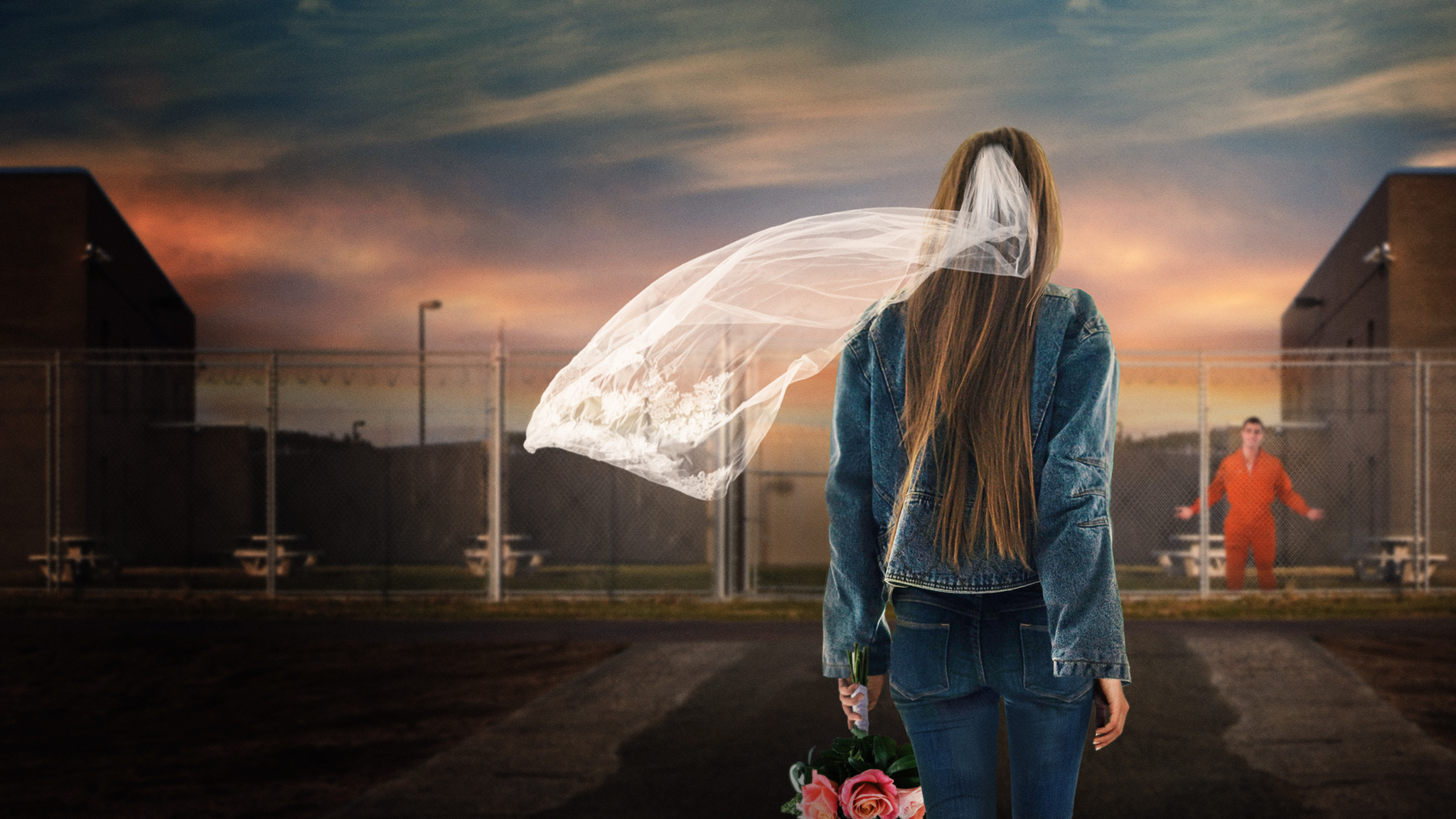
Seven women believe they found their soulmates in the most unexpected of places.
Related content.
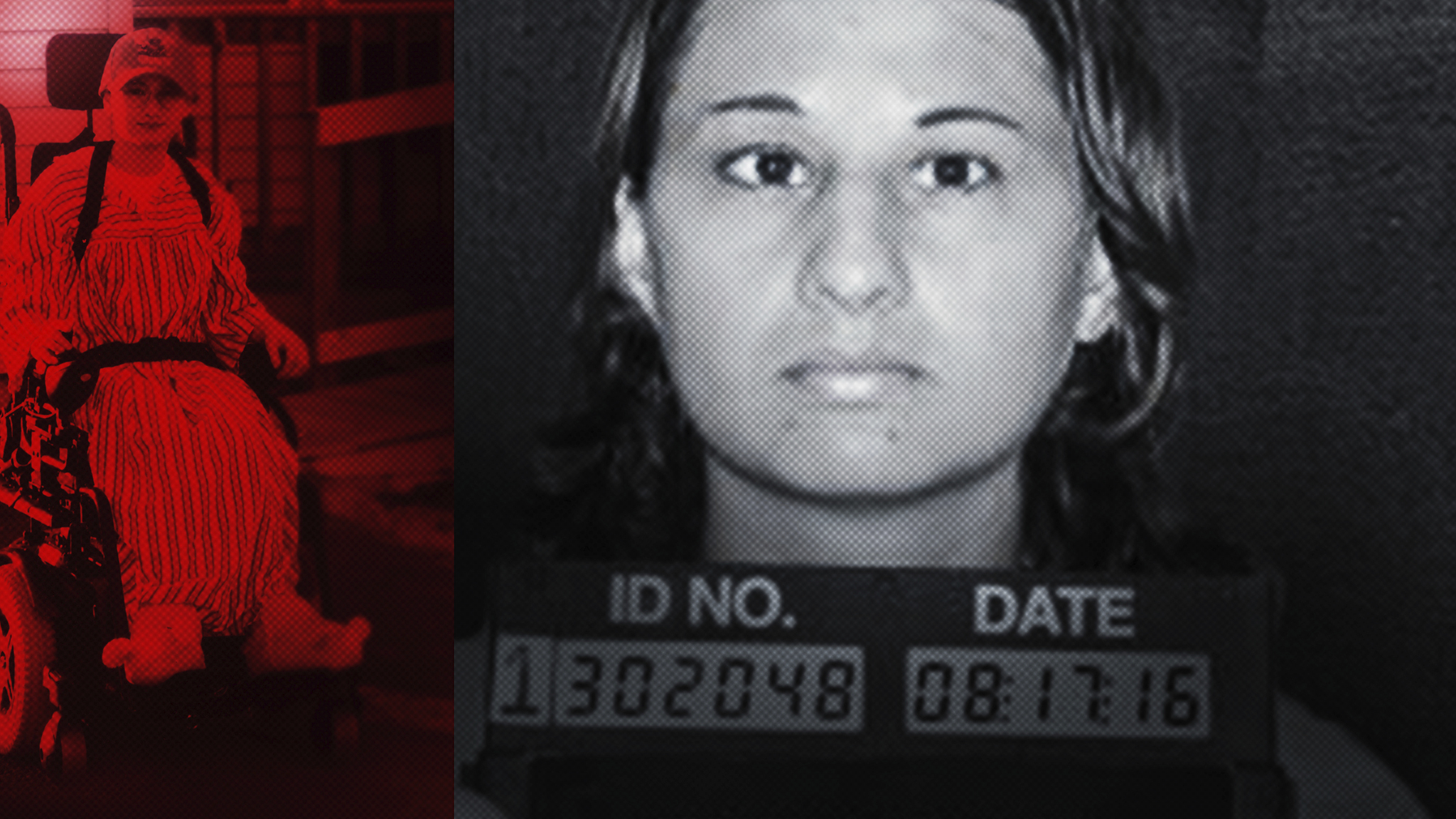
The Prison Confessions of Gypsy Rose Blanchard
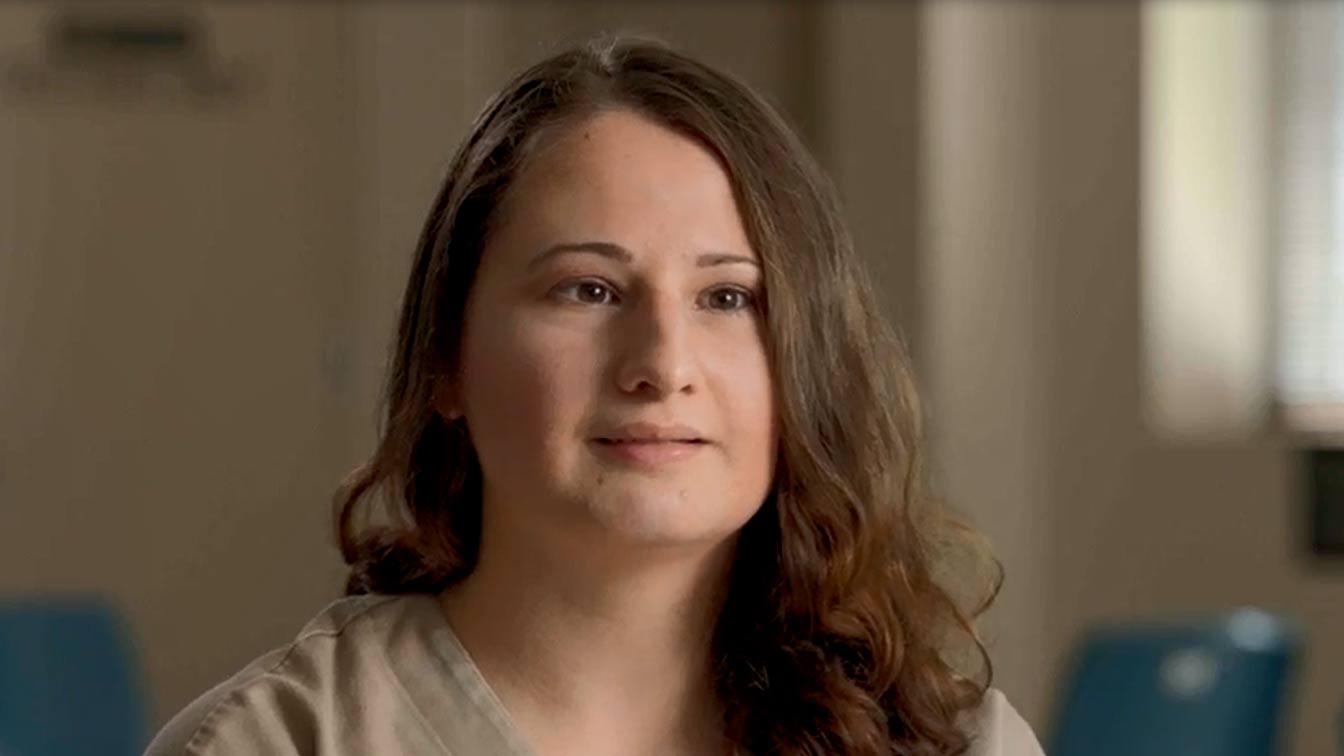
Interview with Gypsy Rose Blanchard on Life After Prison
True crime on lifetime.

#TextMeWhenYouGetHome
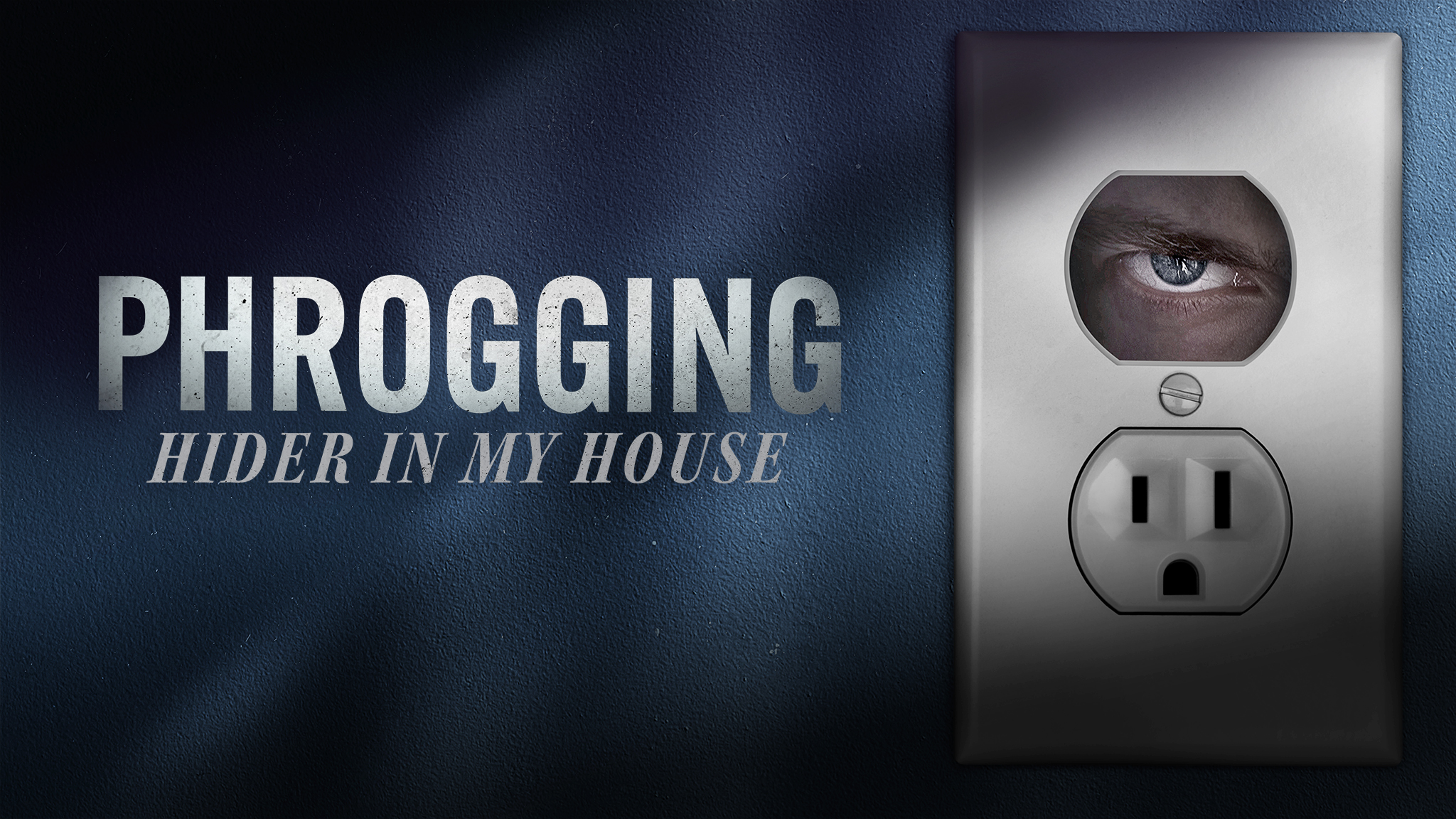
Phrogging: Hider in My House

Meet Marry Murder
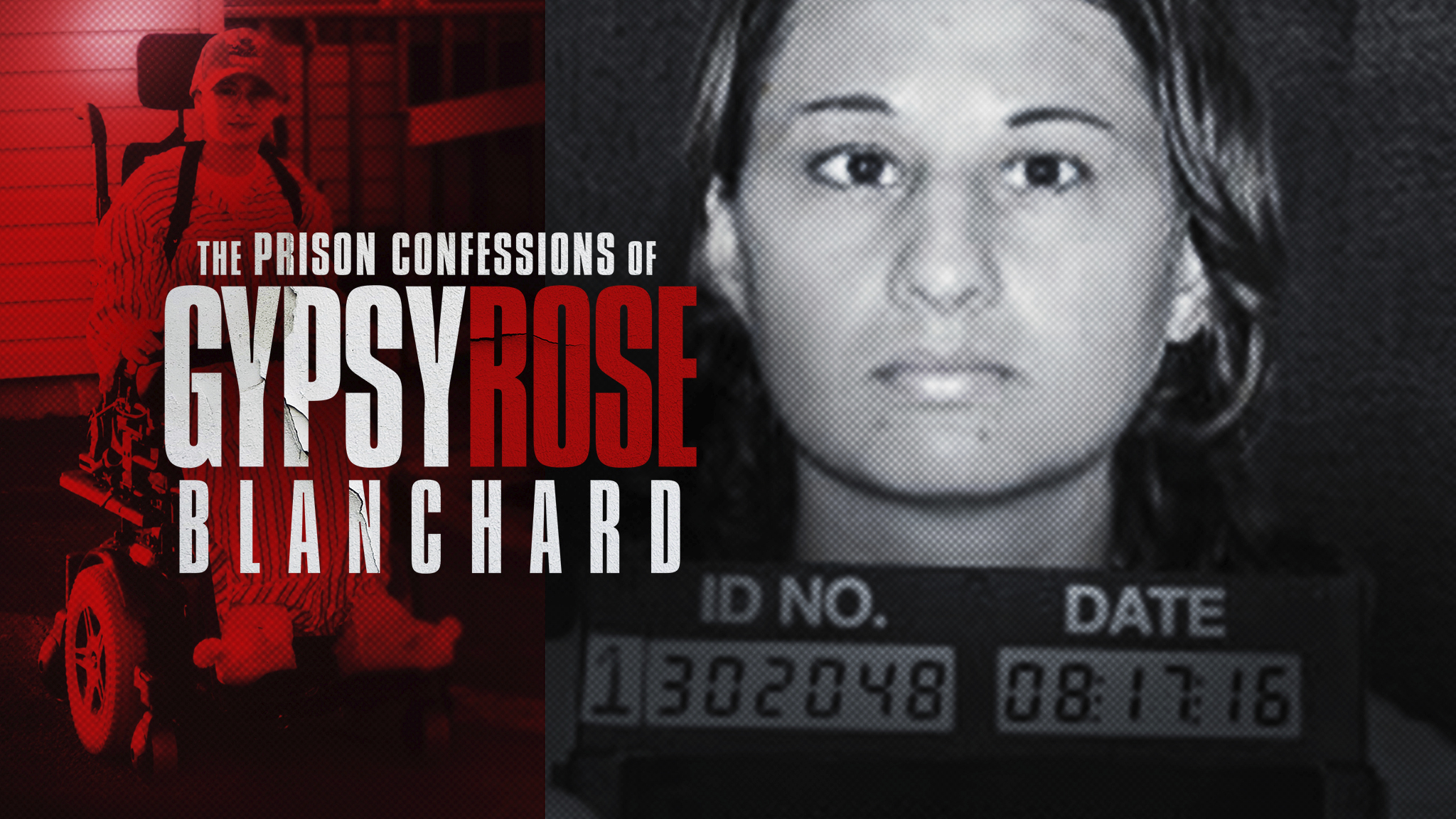
Married at First Sight
TV-14 | Reality

Married at First Sight: Australia

TV-14 | Reality, Romance

Married at First Sight: Couples' Cam
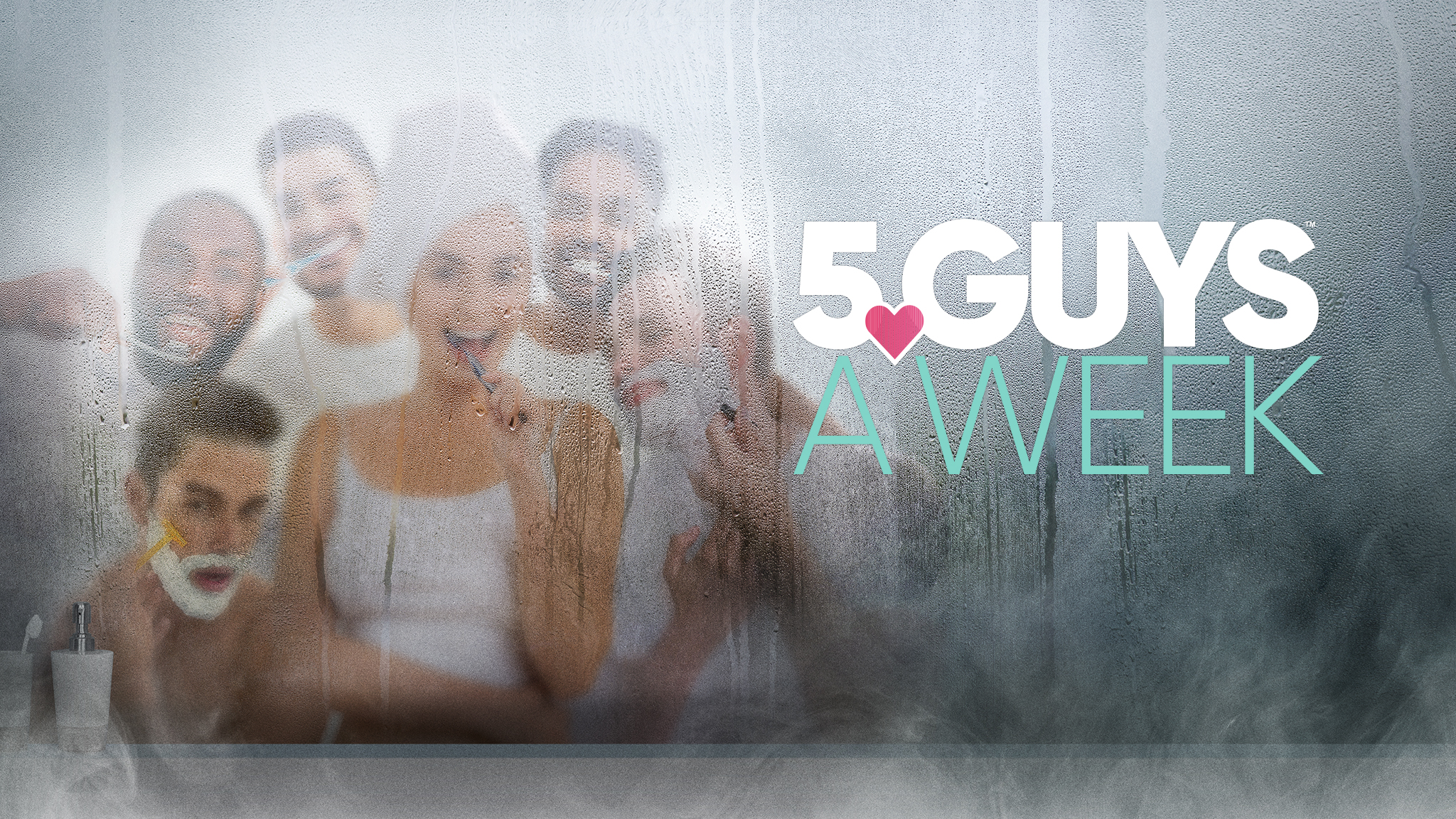
5 Guys a Week

Bride and Prejudice: Forbidden Love

Love at First Flight

Seven Year Switch

Bride & Prejudice

Married at First Sight: Honeymoon Island
About the show.
Lifetime’s explosive docuseries Prison Brides follows seven women from around the world who believe they have found their soulmates in the most unexpected of places, American prisons. While they started off as prison pen pals, these women fell hard and found themselves willing to risk it all for love. The docuseries follows the women as they travel from their homes—many visiting the United States for the first time—to meet their prisoner fiancés, husbands, or partners, to chart their futures together. With the couples facing harsh judgment from friends, family and strangers, the brides grapple with uncertainty and their ultimate decision to risk it all for true love. Will true love prevail for these star-crossed lovers with the odds stacked against them?
Watch Select Episodes Without Signing In
Get Instant Access to Free Updates
Don’t Miss Out on Lifetime news, behind the scenes content, and more.
- Privacy Notice
- Terms of Use
Need help with the site?
Create a profile to add this show to your list.
- Cast & crew
- User reviews
Prisoners Wives

Gemma's perfect life comes crashing down when her husband is arrested for murder. As Gemma learns to navigate the prison system, she starts to think the unthinkable. Gemma's perfect life comes crashing down when her husband is arrested for murder. As Gemma learns to navigate the prison system, she starts to think the unthinkable. Gemma's perfect life comes crashing down when her husband is arrested for murder. As Gemma learns to navigate the prison system, she starts to think the unthinkable.
- Julie Gearey
- Pippa Haywood
- Polly Walker
- Phoebe Dynevor
- 11 User reviews
- 4 nominations total
Episodes 10

- Lead Imate Don …

- Visits Hall Guard
- Security Officer

- All cast & crew
- Production, box office & more at IMDbPro
More like this

Did you know
- Trivia Both Iain Glen and David Bradley have starred in Game of Thrones (2011) .
- Connections Featured in The Wright Stuff: Episode #17.15 (2012)
Technical specs
- Runtime 1 hour
Related news
Contribute to this page.

- See more gaps
- Learn more about contributing
More to explore

Recently viewed

COMMENTS
In 1993, 17 states had conjugal visitation programs. By the 2000s, that number was down to six, with only California, Connecticut, Mississippi, New Mexico, New York, and Washington allowing such visits. And by 2015, Mississippi and New Mexico eliminated their programs. For the most part, states no longer refer to "conjugal" visits.
A conjugal visit is a scheduled period in which an inmate of a prison or jail is permitted to spend several hours or days in private with a visitor. The visitor is usually their legal spouse. The generally recognized basis for permitting such visits in modern times is to preserve family bonds and increase the chances of success for a prisoner's eventual return to ordinary life after release ...
This is the only unit ive experienced visits being cut short, and getting yelled at in front of a bunch of strangers for asking a simple question and not to mention i didn't even get more than 3 words out before the guard got loud. ... A safe place where Wives/Fiances/ Girlfriends and now even Boyfriends and Husbands of an incarcerated Loved ...
In the eyes of the law, conjugal visits are a privilege, not a right. The Supreme Court has repeatedly upheld prison administrators' latitude to limit prisoners' rights, including visitation ...
Prisoners' Wives: Visiting Hours | Prison DocumentaryBehind Bars - Mandaluyong City, CIW: Locked Up Ladies: https://youtu.be/pqtfErznKnQWith kids to feed and...
A brief glance at the origins of conjugal visits in the U.S. prison system quickly disproves that theory, showing that conjugal visit programs were conceived as a tool of exploitation and social control. ... governors like California's Ronald Reagan would determine in 1968 that allowing some married men to have sex with their wives was the best ...
Ebony Fisher, 25, on the road to her mother's house outside Vicksburg, Miss. The conjugal visits she has with her husband, who is serving a 60-year term, are slated to end soon.
Hey love. In today's video I share a story time about my first visit, both my experience and my emotions. This was requested by a few Strong Prison Wives and...
Visiting days are Friday, Saturday, and Sunday. Friday is from 12 pm to 6:30 pm and Sat and Sun are 8:30 am to 3 pm. You can also walk in without an appointment starting at 3:30 pm on Fridays and 11:30 am Sat and Sun. Appointment slots are for every 30 minutes, with the latest slot being when walk-ins start.
The very first conjugal visit (at least the first documented) was in Mississippi in 1918. These visits were initially designed to help maintain family ties. They also helped reduce sexual tensions in prison. After Mississippi started a program, other states followed. By the 1960s, conjugal visits were pretty common in state prisons across the US.
The first true prison visit was quite an experience. We were so glad that my fiance had been designated after a year or two wait in the county jail. We will get the chance to actually touch him, hug and kiss him. He will finally get to hold our son for the first time. He was hours away in a rural area somewhere in the mountains.
When the prison allows visits again, we will meet face to face. Soon after that, we will be married. First comes, love, then comes marriage. You guys know I want a baby in the baby carriage! So, I put my unltmate wish in the hands of Jesus. He I trust with all that is in my future. If you pray, please keep me, my fiance and our baby in your ...
Eventually, the prison started allowing prisoners' wives and girlfriends to visit as well. The idea eventually caught on, and over the years, many other states adopted the idea of letting wives spend time with their inmate husbands, with over 1/3 of states in the United States eventually enacting some type of conjugal visit program.
Prison Wives is a TV series about the wives, husbands and significant others' of prisoners serving time. What keeps them together?Investigation DiscoveryProd...
"Prison Wives" was a reality TV series that aired on Investigation Discovery, providing a glimpse into the lives of women married to inmates. The show highlighted their daily struggles and the strength it takes to maintain a relationship with someone who is serving time. ... Programs that facilitate prison visits and family reunification ...
7. Just being away from all the prison politics and activities. 8. Feeling like me again. 9. Being able to tell my wife how beautiful she is. 10. Confessing my love and gratitude for my wife. 10 Reasons Prison Visits Make Prison Wives Woosah from the Mrs. After reading his list and seeing how similar our lists are I couldn't help but laugh.
7. Just being away from all the prison politics and activities. 8. Feeling like me again. 9. Being able to tell my wife how beautiful she is. 10. Confessing my love and gratitude for my wife. 10 Reasons Prison Visits Make Prison Wives Woosah from the Mrs. After reading his list and seeing how similar our lists are I couldn't help but laugh.
Harriet is thrust from her cosy, middle-class world into the humiliation of prison visits, intimate searches and indiscriminate violence. She's plainly terrified, guilt-ridden and utterly lost in ...
Prison visits . Why is it so hard to leave the love of your life behind and watch him walk away last week was my first visit in the prison after not seeing my boyfriend for 8 months it was very hard and emotional specially the goodbyes 😞🥺 ... A safe place where Wives/Fiances/ Girlfriends and now even Boyfriends and Husbands of an ...
Tracey was arrested 10 days after her honeymoon and faced a 40-year prison sentence and separation from her four children and new husband Darreyl. George's drug addiction and life of crime weighed heavily on his marriage, and his wife wasn't sure if she could continue supporting him. Shane's relationship with his three children was destroyed ...
Crystal Bermudez met her husband, Fernando, while he was being held in New York City's Rikers Island jail in 1991. At the time, she was 18 years old and living with her parents in Oklahoma.
Lifetime's explosive docuseries Prison Brides follows seven women from around the world who believe they have found their soulmates in the most unexpected of places, American prisons. ... The docuseries follows the women as they travel from their homes—many visiting the United States for the first time—to meet their prisoner fiancés ...
Prisoners Wives: Created by Julie Gearey. With Pippa Haywood, Polly Walker, Phoebe Dynevor, Iain Glen. Gemma's perfect life comes crashing down when her husband is arrested for murder. As Gemma learns to navigate the prison system, she starts to think the unthinkable.